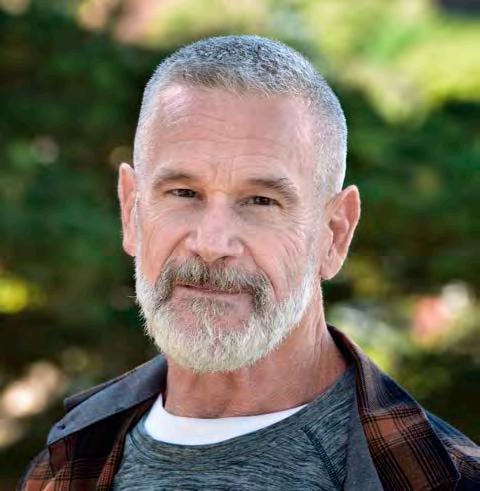












by John Ferrannini
Residents of San Jose’s District 3 have launched a campaign to recall embattled gay City Councilmember Omar Torres – who was stripped of his committee assignments and urged by colleagues to resign when it was revealed he’s under criminal investigation after he admitted in a text message to performing oral sex on a 17-year-old.
Meanwhile, Torres, 43, has asked to take a leave of absence from City Hall, citing the recommendation of a doctor.
In other news, prominent Silicon Valley LGBTQ groups are condemning stereotyping of LGBTQ people alongside sexual abuse, while not taking a specific stance on the Torres matter.
See page 10 >>


Senator Scott Wiener spoke at a community gathering September 27 at the proposed site of the


The Castro Merchants Association held its Halloween block party in the LGBTQ neighborhood Sunday, October 27. Among those having a good time were Marisol Garcia and Alfonzo Figuerua, who posed with a

by Lisa Keen
For many people, the specter of November 8, 2016 looms large over Election Day on November 5. That day eight years ago was poised to see the Democrat Hillary Clinton become the first woman president. Famously, it didn’t happen. At 11:40 p.m. Pacific Time that night, major media began calling the race for Republican Donald Trump.
Four years later, it took until the Saturday after Election Day before two major news coalitions could report Democrat Joe Biden was the victor over Trump.
This year, it is hard to predict when a winner in the presidential race between Republican Trump and Democrat Kamala Harris might become apparent. As the New Republic magazine (https://newrepublic.com/article/187425/ gop-polls-rigging-averages-trump) reported October 23, “A flood of GOP-aligned polls has been released for the precise purpose of influencing the polling averages, and thus the election forecasts, in Trump’s favor.” Looking at only well-known independent polling operations, several things seem clear at this point, just days before the election.
See page 2 >>
giant Catrina skeleton. There were costume contests and drag performances all while supporting local artists and small businesses. For more photos, check out page 19 in the arts section. Rick
by Matthew S. Bajko
The San Francisco Board of Supervisors has approved a deal that will see the city purchase a property in the LGBTQ Castro district to establish the country’s first freestanding LGBTQ history museum and archival center. The sale is expected to close next month. The 11 supervisors unanimously voted in support of the deal at their meeting Tuesday, October 29, as LGBTQ History Month enters its final days. They will need to take a second, perfunctory vote next Tuesday to finalize their approval, at which point the city’s real estate division will be able to complete the purchase of 2280 Market Street at Noe Street.

PRESIDENT AND VICE PRESIDENT Kamala Harris and Tim Walz
U.S. SENATE Adam Schiff
SF MAYOR London Breed, first choice Aaron Peskin, second choice
SF BOARD OF SUPERVISORS
Dist. 1: Connie Chan
Dist. 3: Sharon Lai, first choice; Danny Sauter, second choice
Dist. 5: Dean Preston
Dist. 7: Myrna Melgar
Dist. 9: Roberto Hernandez, first choice
Stephen Torres, second choice
Dist. 11: Ernest “EJ” Jones, first choice
Michael Lai, second choice
SF DISTRICT ATTORNEY Brooke Jenkins
SF CITY ATTORNEY David Chiu
SF SHERIFF Paul Miyamoto
SF TREASURER TAX COLLECTOR José Cisneros
SF BOARD OF EDUCATION Matt Alexander
Jaime Huling
John Jersin Parag Gupta
CITY COLLEGE OF SF Luis Zamora Alan Wong Aliya Chisti
Heather McCarty
BART BOARD DIST. 9 Joe Sangirardi
OTHER RACES ALAMEDA COUNTY BOARD OF SUPERVISORS
Dist. 5: John Bauters
OAKLAND CITY COUNCIL
Dist. 3: Warren Logan
Dist. 5: Erin Armstrong
At-Large: Rowena Brown
BERKELEY CITY COUNCIL
Dist. 2: Terry Taplin
Dist. 6: Andy Katz
EAST BAY MUD Ward 5: Jim Oddie
EL CERRITO CITY COUNCIL William Ktsanes Rebecca Saltzman
MOUNTAIN VIEW
by John Ferrannini
In the last week of an otherwise divisive struggle for San Francisco mayor, all five major candidates appeared together alongside elected officials and the city’s business community to advocate for Proposition M to pass on November 5.
“If you care about the future of small businesses, if you care about the resilience of our economy, if you care about the revival of downtown, if you care about the services that are provided by our general fund – whether that be police, fire, our social services for vulnerable folks, or our public transportation – you must vote yes on M,” said gay District 8 Supervisor Rafael Mandelman, who played a role in starting the effort for the proposition. “It’s too important to play games with.”
Like most tax policy, Prop M is complex; but essentially, it changes the sources of San Francisco’s general fund revenues to be less dependent on where businesses are located and more dependent on the categories under which they are classified. It would also raise the amount that exempts a business from business taxes from $2.25 million to $5 million, and prevents a tax increase scheduled to kick in next year.
San Francisco Mayor London Breed, a straight ally, said at the October 29 rally that the measure is meant to update tax policy in line with the city’s post-COVID business climate, where there’s fewer office workers downtown and several large employers have pulled up stakes. Prop M would make the city’s tax revenue less dependent upon large businesses.
“The top five companies pay the top taxes in San Francisco, which makes us very vulnerable if one of those five companies decides to leave,” the mayor said.
The measure would reduce payroll taxes to encourage companies to stay.
The San Francisco Standard reported that the top five corporate taxpayers in the city pay 29% of overall business taxes; the city controller and treasurer are prevented from stating which companies these are, but the news outlet speculated Salesforce, Visa, Uber, Pacific
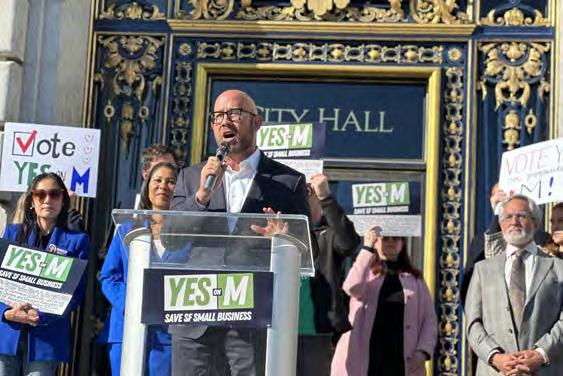
Gas and Electric, and Airbnb may be among them.
“Last year after talking to businesses over and over again about what the challenges were, we had discussions about having a fairer, more predictable tax system that meets the needs of big businesses and small businesses alike,” Breed continued. “So Supervisor [Aaron] Peskin and I, alongside Supervisor Rafael Mandelman, we came together alongside our departments and the controller’s office and it took a lot of experience to help reach a consensus of Proposition M that will create a fairer, structural tax system that will have a significant impact on our city, and in a responsible way, for years to come.”
Proponents estimate that the business tax exemption will apply to 2,700 small businesses throughout the city. One small businessperson in support is Mat Schuster, a gay man who is owner and chef of Castro neighborhood Spanish restaurant Canela Bistro and Wine Bar.
“San Francisco has just become increasingly difficult for small businesses to stay and operate, so anything that helps small business stay here is great,” Schuster said. “We’re a small, 50-seat restaurant. We’re in our 14th year. We’re bringing home less money than ever before. Expenses are super high, and these
days we need all the help that we can get. This is something, I think, that will help a lot of small businesses.”
Not everyone is so sanguine on Prop M, however. Proposition L co-author Chris Arvin told supporters of their “Fund the Bus!” measure to skip over Prop M. Prop L is a gross receipts measure that would add a 4.5% tax on the revenue of Uber, Lyft, and Waymo in the city to fund public transportation.
The reason is because Prop M contains language that nullifies another gross receipts tax if the other tax passes with fewer votes than Prop M.
That language is contained in Prop M because of the potential for a competing measure in case the negotiations between business and labor groups that crafted Prop M along with Breed, Mandelman, and Peskin failed, the San Francisco Examiner reported It was not intended to stop Prop L. If Prop L passes with more votes than Prop M, then both measures would go into effect.
“People can and should vote for both,” Mandelman told the B.A.R. “There are some people who are telling people to vote no on M or not vote on M. I think that’s a pretty dangerous message.”
San Francisco Controller Greg Wagner predicts that for the first three fiscal
years (2024-25 to 2026-27), Prop M would reduce revenues by $40 million annually.
“While uncertain this projected loss may be smaller if the measure helps enable the city to reduce reserves for disputed taxes in the future,” he stated in a financial analysis of the measure.
“Beginning in 2027, scheduled rate increases would generate positive revenues of approximately $50 million annually in FY 2028-29 and thereafter. By FY 2029-30, the total positive revenue resulting from the rate increases would offset the reduced revenue in the first three years, making the total amount of business tax revenue over that period comparable to current law.”
After 2029-2030, Prop M is expected to continue to generate $50 million more in revenue annually than would be generated otherwise, Wagner concluded.
Prop L, on the other hand, would result in $25 million more in revenue annually starting next year, Wagner stated in a separate analysis.
However, the San Francisco Municipal Transportation Agency’s annual deficit is in the hundreds of millions. Prop L revenues could be used only for maintaining or increasing service levels, preserving or improving routes that serve schools, libraries and parks, and discount programs for the elderly, youth, students, low-income, and/or disabled San Franciscans.
Cyrus Hall, campaign manager for the Yes on L campaign, stated to the B.A.R. that, “We can have business tax reform and save over 10 bus lines next year if Prop L gets more votes.”
“Unfortunately, Prop M includes a conflict clause that would invalidate Prop L if Prop M gets more votes, even though there is no substantive conflict between the two measures,” Hall stated in an October 29 email. “We specifically wrote Prop L in a way that would not conflict with business tax reform, which is why both L and M can go into effect if L gets more votes.”
Peskin, a straight ally who is president of the Board of Supervisors and running for mayor against Breed,
thanked the many people who came together, including the labor, large and small businesses, and entertainment communities.
“There is nothing more taxing than tax policy, but this is what happens when we all work together and we all listen,” he said. Thank you Mayor Breed, thank you Supervisor Mandelman, and in particular thanks to all of the different interests that came together and listened to one another … Everybody came together and had to compromise.”
District 11 Supervisor Ahsha Safaí, a straight ally who is running for mayor, said the measure will help small businesses like those in his largely working class district.
“When you talk to small business owners, it’s death by a thousand cuts in this city,” Safaí said. “Sixty-nine fees are going to be eliminated that are going to help businesses put money back in their pocket, invest in their small businesses and begin to hire more frontline workers. This is particularly important to people that are struggling – mom and pop businesses in this city – the backbone of what makes San Francisco special and unique.”
Candidate and former interim mayor Mark Farrell, a straight ally, also showed up to say Prop M is “truly a consensus measure.”
“I’m here because I believe there is no more important measure to the economic success of our city, to the thousands of small businesses that exist in San Francisco today” Farrell said. “They represent the heart and soul of our city. They employ the most people throughout San Francisco in our commercial corridors, in our neighborhoods.”
Candidate Daniel Lurie, a straight ally who is an heir to the Levi’s fortune who later became founder and CEO of the nonprofit Tipping Point Community, said he appreciated Breed, Peskin and Mandelman for their “good work.”
“Yes on M is going to be an important first step to bring small businesses back,” Lurie said. “When this city is at its best, we are the greatest city in the world. We know this. We’re not there yet; we will be; yes on M will help us get there.” t
In the other 41 states, where results seem largely predictable (due to each state’s past voting records, current large polling margins, and known demographics), Harris has 222 electoral votes and Trump 214. Add in the likely splits from Nebraska and Maine, the numbers show Harris with a core 226, and Trump with a core 219.
If swing state electoral votes are distributed based on who has the tiniest of margins, Harris appears poised to win 276 to Trump’s 262. It takes 270 electoral votes to win.
New affordable housing opportunity 275 Coleman
Washington, and Oregon at 8 p.m. will yield Harris the 74 electoral votes of the three West Coast states. Idaho, which closes at the same time, is expected to give its four electoral votes to Trump.
But no one should count on getting to bed at a decent hour November 5; there are just too many ifs, ands, and buts –numerous other scenarios could play out, including the possibility that some states will not know their results until many hours or days after the polls close.
Other races
Scott Wazlowski <s.wazlowski@ebar.com>
To: Scott Wazlowski <s.wazlowski@ebar.com>
In the seven battleground states polls are too close to predict the outcome: Georgia, North Carolina, Pennsylvania, Michigan, Wisconsin, Nevada, and Arizona. They have a combined total of 93 electoral votes. In 2020, Biden won six of the seven (all but North Carolina). Current polling in these states suggest Harris will take 50 electoral votes to Trump’s 43. Two states, Nebraska and Maine, split their electoral votes based on who wins each congressional district. Polling at the moment suggests that, of the nine electoral votes they have combined, five will go to Trump and four to Harris.
Hello Scott, I did little editions, here is the updated add Thank you
In Harris’ clearest path to 270 electoral votes, if by 7 p.m. Pacific Time, Trump has accumulated 258 electoral votes to Harris’ 196, poll closures in California,
275 Coleman
Plus, there are other races of interest to LGBTQ voters Tuesday night. Perhaps the most significant is lesbian U.S. Senator Tammy Baldwin’s (D-Wis-
consin) very tight race to win reelection to a third term. Republicans have pummeled her state with television ads claiming that Baldwin is an extreme radical trying to “force girls to share locker rooms with biological men.” Her Republican opponent, Eric Hovde, has been claiming Baldwin wants to “change Title IX to allow guys to play in girls’ sports and guys to go into girls’ locker rooms and bathrooms.” They have even derided her for “being in bed with Wall Street,” a thinly-veiled reference to other attack ads noting that Baldwin’s wealthy girlfriend, Maria Brisbane, is an investment adviser in Manhattan.
Jose Felix <JFelix@mercyhousing.org> Thu, Oct 24, 2024 at 4:59 PM
53 Affordable Rental Units Available at 275 Coleman Street San Francisco, CA 94124. 4 studios, 15 one-bedroom, 23 two-bedroom, 10 three-bedroom, 1 four-bedroom and 1 five-bedroom units are available. Rents range from $1,261 to $2,049 per month.
275 Coleman Apartments 53 Affordable Rental Units Available at 275 Coleman Street San Francisco, CA 94124. 4 studios, 15 one-bedroom, 23
Households must earn no more than the Maximum Annual Income below:
Applications and information can be found on DAHLIA - San Francisco Housing Portal at housing.sfgov.org. Applications are due by 5pm on October 16, 2024. Please call our information line at 628.300.1218 for more information.
Units available through the San Francisco Mayor’s Office of Housing and Community Development and are subject to monitoring and other restrictions. Visit sf.gov/mohcd for program information.

Curtis Bashaw, a gay Republican, is running a long-shot campaign for the open U.S. Senate seat in New Jersey but is not expected to win. Democratic Congressmember Andy Kim is expected to keep New Jersey blue.
Thomas Gee
October 27, 1931 – September 23, 2024
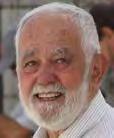
Thomas Gee passed away peacefully September 23, 2024, at home in San Francisco, a city he so dearly loved. Tom was born in Arcadia, California and was raised with his younger brother, Winston. He graduated from Pomona College and served in the U.S. Navy overseas. After graduating from the UC Berkeley School of Law, he was admitted to the bar in 1961. He began as a criminal defense attorney for Alameda County for four years before entering private practice in San Fran-
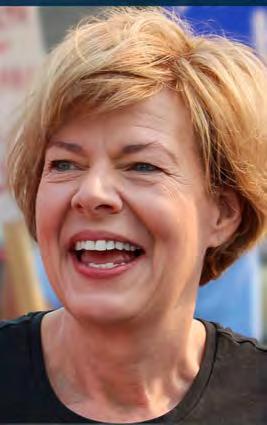
cisco for 40 years. Tom had a vibrant, astute mind and a gift for establishing warm, lasting friendships. Dinners at his home were numerous, lively, and always special. He first lived and loved being in North Beach enjoying the Beat culture, then he moved to the Castro in 1971 where he embraced gay life. Tom loved to travel and did so extensively, becoming expert in all things French. He met his future spouse, Patrick Faverie, in 1989. They purchased and restored Patrick’s family’s stone cottage in Normandy where he lived out his retirement and where he is remembered for his “joie de vivre” and his knowledge of places, people, books, and politics. Tom is survived by his loving spouse, dear friends, and family.

The Migration: Reflections on Jacob Lawrence
Washington DC’s celebrated step dance company tells the story of the Great Migration in this vivid production inspired by Jacob Lawrence’s famous paintings from the 1940s, set to an uplifting soundtrack with movement that mixes stepping, tap, body percussion, and modern dance.
An Illuminations: “Fractured History” event. calperformances.org/illuminations
Nov 2–3
ZELLERBACH HALL, BERKELEY
Leonidas Kavakos, violin
Bach’s Complete Sonatas and Partitas for Solo Violin
In a rare and powerful musical experience, the virtuoso Greek violinist performs Bach’s complete works for solo violin over two nights, groundbreaking compositions that conjure vast sonic landscapes. Kavakos performs Partita No. 3 and Sonatas No. 2 and 3 on night one; and Partitas No. 1 and 2 and Sonata No. 1 on night two.
Nov 15–16
ZELLERBACH HALL, BERKELEY

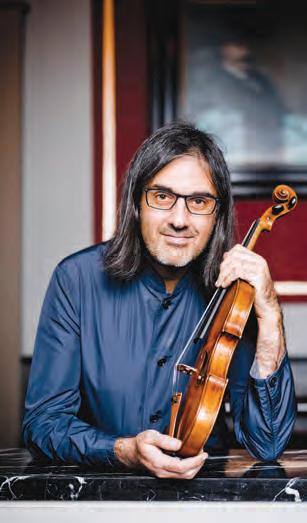
Disney Concerts Presents Encanto: The Sing-Along Film Concert

Disney’s beloved animated feature comes to life in an interactive performance and screening that's perfect for the whole family. Sing along to the award-winning soundtrack with songs by Lin-Manuel Miranda, played live by Banda de la Casita!
Nov 24
ZELLERBACH HALL, BERKELEY
Asmik Grigorian, soprano Lukas Geniušas, piano
Among the most electrifying performers of her generation, the Lithuanian soprano makes her first West Coast appearance with an all-Russianlanguage Cal Performances debut recital, performing rarely heard songs— “small pieces of opera in a few minutes”— by Tchaikovsky and Rachmaninoff.
Dec 15
HERTZ HALL, BERKELEY

Jessie Montgomery, and Emmy-winning American Indian composer Jerod Impichchaachaaha’ Tate.
An Illuminations: “Fractured History” event. calperformances.org/illuminations
Nov 3 HERTZ HALL, BERKELEY

Praised for his extraordinary technique and musicianship, the German pianist enjoys assembling bold recital programs, and here matches Brahms’ moody Ballades with Liszt’s fiendishly challenging transcription of Beethoven’s Seventh Symphony.
“A superlative interpreter of Beethoven, whose power is always cumulative in effect.” The New Yorker
Nov 19
ZELLERBACH HALL, BERKELEY
Pilobolus re:CREATION

The commanding Uzbek pianist makes his Cal Performances debut in a program that foregrounds story and image, including selections from Prokofiev’s piano adaptation of his ballet Romeo and Juliet, Mussorgsky’s Pictures at an Exhibition, and Florence Price’s cinematic Fantasie nègre No. 1.
Nov 10
HERTZ HALL, BERKELEY
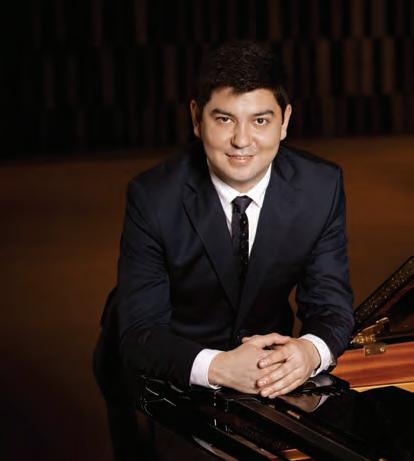
Maxim Vengerov, violin Polina Osetinskaya, piano
The multiple Grammy and Gramophone Award-winning violinist returns to Berkeley in a program that showcases the blazing virtuosity and breathtaking expressiveness that have been the hallmarks of his sound for decades. Works by Prokofiev, Franck, and Ravel.
Nov 23
ZELLERBACH HALL, BERKELEY
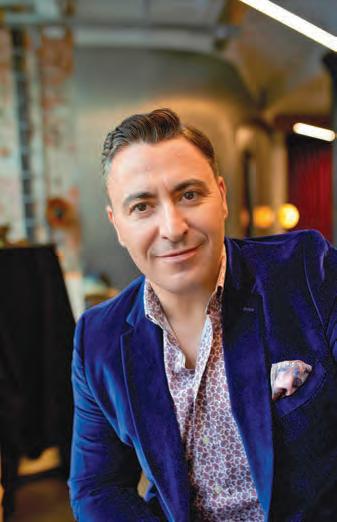
BAY AREA PREMIERE Dorrance Dance The Nutcracker Suite In this retrospective production, the pioneering acrobatic dance troupe invites us to step into a realm where imagination knows no limits, the boundaries of gravity and creativity blur, and storytelling takes on new dimensions.
THANKSGIVING WEEKEND
Nov 30–Dec 1
ZELLERBACH HALL, BERKELEY

Dec 21
ZELLERBACH HALL, BERKELEY
Dec 14–15
ZELLERBACH HALL, BERKELEY

Antonio Sánchez Birdman LIVE
The Academy Award-winning Best Picture, Birdman, screened to a live soundtrack
In this special screening and concert, Antonio Sánchez celebrates the 10th anniversary of Alejandro Iñárritu’s film (starring Michael Keaton) with a riveting live performance of his Grammy-winning solo drum set score.
Jan 18
ZELLERBACH HALL, BERKELEY

by Cynthia Laird
Three LGBTQ legal professionals, including the country’s first transgender trial court judge, will receive the American Bar Association’s prestigious Stonewall Award, the organization announced. The awards will be presented during the ABA’s Midyear meeting in Phoenix on February 1.
The ABA’s Stonewall Award is given by its Commission on Sexual Orientation and Gender Identity. Named after the New York City Stonewall Inn police raid and riot of June 28, 1969, which was a turning point in the gay rights movement, the award recognizes lawyers who have advanced lesbian, gay, bisexual, and transgender individuals in the legal profession and successfully championed LGBTQ legal causes.
Alameda County Superior Court Judge Victoria Kolakowski is one of the recipients. Kolakowski, the wife of Bay Area Reporter news editor Cynthia
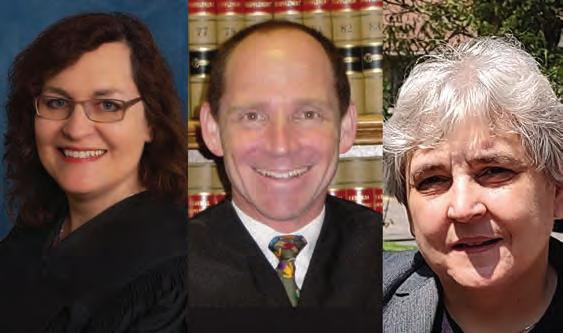
Laird, made history in November 2010 when she was elected to her judicial seat.
Since then, there have been only a handful of transgender trial court judges, including Andi Mudryk, who was ap-
pointed to the Sacramento County Superior Court by Governor Gavin Newsom in 2022.
Phyllis Frye, a transgender woman, was appointed by lesbian former Hous-
ton mayor Annise Parker to a municipal judgeship in 2010, just weeks before Kolakowski was elected, but she did not hear trials. Frye retired in 2023 and previously received an ABA Stonewall Award.
The other Stonewall Award honorees are Los Angeles County Superior Court Judge D. Zeke Zeidler, who in 2004 became the first gay man elected to the Southern California court, and Kristen Galles, a Title IX civil rights attorney based in Virginia, according to separate news releases from the ABA.
Prior to serving on the Alameda County bench, Kolakowski in 2006 was the first transgender administrative law judge when she served in that position for various state agencies.
Kolakowski is a former president of the International Association of LGBTQ+ Judges. A global advocate on LGBTQ and transgender legal issues, she is also a leading educator for the judiciary and the legal com-
compiled by Cynthia Laird
St. Mark’s Lutheran Church celebrated its 175th anniversary with a special service Sunday, October 27.
The church, at 1111 O’Farrell Street, also marked the 130th anniversary of its building, which is a San Francisco registered landmark (No. 41).
Lutheran Bishop Jeff Johnson, a gay man, delivered the sermon, said the Reverend Dan Buringrud, who is the senior pastor at St. Mark’s.
Buringrud, a straight ally, told the B.A.R. that he’s only recently arrived at the church, starting in the position just under two months ago. Prior to that, he had been the longtime pastor at a Lutheran church in Ellicottville, New York.
St. Mark’s is the first Lutheran church in the state and survived the 1906 earthquake, though it suffered extensive damage in the 1989 Loma Prieta quake, Buringrud said. While the building has been repaired from that temblor, ongoing work is needed to maintain the facility. He explained. The church now is in the midst of a $3 million capital cam paign for that project, he said.
St. Mark’s was also a founding member of the San Francisco Interfaith Council and is a site for the council’s winter shelter program that operates from mid-January to
mid-February. And the church has established affordable housing, Buringrud said.

“We have been at the forefront of affordable housing on church properties,” he noted.
St. Mark’s has long had its Martin Luther Towers, a 13-floor affordable senior housing complex. It currently has two affordable projects in St. Mark’s Square, one for those over 55 and one for families. The goal is to have 300 or so affordable housing units.
See page 10 >>
munity on transgender issues, the release stated.
Currently, she is an adjunct professor at the University of San Francisco School of Law. She teaches the class “Equality and Religious Freedom” on the intersection of religious freedom and equality rights, the release noted. Kolakowski has a B.A. from New College of Florida, an M.S. from Tulane University and the University of New Orleans, a J.D. from Louisiana State University, and a Master of Divinity from Pacific School of Religion.
“I am deeply honored to receive this important recognition,” Kolakowski stated in a Facebook message. “A little over 35 years ago, I was denied the opportunity to take the Louisiana bar exam because I am transgender. I didn’t give up then, and I never will. I challenged that decision and I won. That is the spirit of Stonewall.
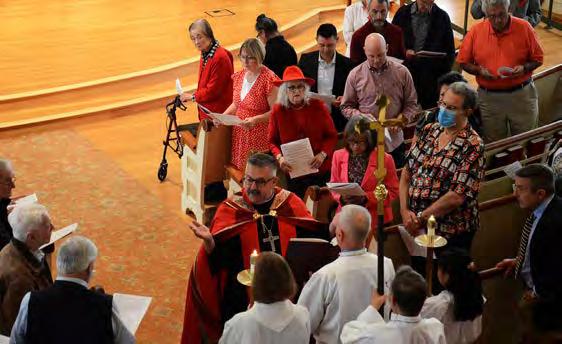

by Matthew S. Bajko
In response to the movement to ban books about race and LGBTQ topics from libraries being pushed by Republican lawmakers and conservative parents, independent book publishers banded together to create a counter campaign. They chose to launch it in September, as the month is when the annual Banned Books Week takes place.
Their goal via the We Are Stronger Than Censorship initiative is to raise enough money to purchase at least 2,000 books that have been pulled from library shelves and distribute them to readers across the U.S. To date, the Independent Book Publishers Association has raised nearly $10,000, which will cover 1,244 books.
“We are 62% of the way there!” noted Lee Wind, the chief content officer for the association, which is based in the Southern California city of Manhattan Beach. “This is a marathon not a sprint. Our goal is to pass that 2,000 number and be able to donate lots more books.” Wind, 57, who identifies as both gay and queer, is himself an author who has seen his titles be censored. Among his personal catalog of books he has written, the one that has been banned the most – at five times now – since being published in 2021 is his “No Way, They Were Gay? Hidden Lives and Secret Loves” that looked at the queer lives of two dozen historical figures.
“We wanted to acknowledge this is a long-standing problem and push back against it, and put on the brakes to an out-of-control train,” said Wind, who lives in the Los Angeles neighborhood of Marina Del Rey.
With the anti-censorship campaign being an inaugural effort this year, Wind told the Bay Area Reporter that he and his colleagues in the association have been pleased with its success so far. It officially debuted September 9 with the unveiling of a dedicated website at wear-

estrongerthancensorship.org.
“I think people are generally excited there is some way to go on offense about this,” he said. “We are not trying to take the spot of the wonderful organizations fighting book bans. We want to add another tool to the toolbox of what we are all doing.”
As the B.A.R.’s online Political Notes column first reported last month, the publishers association has been asking people to donate $16 toward the campaign as the amount equals the purchase price for two banned books. People can also order branded merchandise like muscle shirts and sweaters via the website https://www.bonfire.com/store/ we-are-stronger-than-censorship/ with the proceeds dedicated toward the anticensorship campaign.
The initiative needs to raise $16,000 to hit its target of 2,000 books, with the first batch to be mailed out in November to selected groups that will oversee their distribution in their local areas. While the deadline to achieve that goal is August 31 next year, ahead of the launch of the We Are Stronger Than Censorship
initiative’s second year, Wind told the B.A.R. he expects to surpass the book buying target “before then.”
“If book banning stops, maybe we won’t need to,” said Wind of resetting the initiative’s goals in the fall of 2025. “Until it stops, I definitely think it is important for us to be pushing back against the banning in this way.”
Purchasing banned books
The association plans to purchase banned books released by 20 different publishers as part of the campaign. It has, so far, selected 12 titles to date, and the list can be seen at wearestrongerthancensorship.org/ banned_books-shopping_list.
One of the selected books is “I’ll Be the Moon: A Migrant Child’s Story” written by Phillip D. Cortez and illustrated by Mafs Rodríguez Alpide. Published in 2023 by The Collective Book Studio, the book is centered on a young girl who must cross the U.S. border from Mexico to reunite with her father.
“We have to walk the walk. One way to do that is by purchasing these books for these organizations who need help,” said Angela Engel, a straight ally with a queer daughter who owns the Oakland-based publishing house and is a member of the industry association. “We are also then supporting an ecosystem of independent publishers who can then continue the work we are doing.”
The publishers association had partnered with the EveryLibrary Institute (https://www.everylibraryinstitute.org/) for the campaign with the idea of buying two or more books for every book that was banned or challenged in September. Tasslyn Magnusson, Ph.D., has been monitoring book bans across the U.S. for the institute and cataloged 10,000 challenges to books and bans between July 1, 2023 and June 30, 2024.
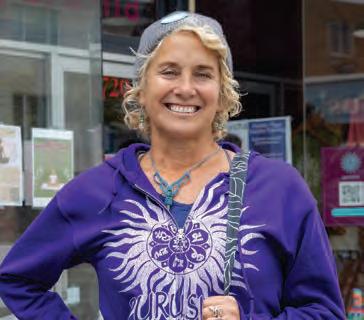

That averages out to more than 830 per month.
“We are trying hard to get a concrete count, but we are looking at hundreds of challenges, restrictions, and removals across the country. This is a conservative guess,” stated Magnusson. “What we are seeing that is not quantifiable in numbers, is entire collections of literature for young people being pulled into adult collections in public libraries that will require either parental permission or actual parents to check out literature for their kids.”
Thus, there is no definitive count for how many books were banned last month. Part of the problem, said Wind, is there is no central reporting method for people to alert advocates when a book is banned in their community.
People can alert EveryLibrary or email Wind’s association at bookbanschallenges@gmail.com. They can also fill out Pen America’s form at https://pen.org/issue/book-bans/, contact the American Library Association, or share the information with the National Coalition Against Censorship. With various groups collecting the data, it makes counting up the number of banned books in a given month “difficult,” noted Wind.
“What we are seeing is if someone wants to report a book being banned or challenged in their community, they are supposed to tell a lot of different places about it. We are trying to figure out a way to centralize it, so it isn’t so much work,” he said.
Another problem is “softer censorship,” said Wind, where even talk of banning books results in a “chilling effect” on librarians and teachers being “afraid to bring books in” to either a library or classroom for fear of being reprimanded or fired.
“A big part of this is the economic injustice of it, too,” he said. “This af-
fects people who rely on public access and libraries, whether at schools or public libraries, to see themselves reflected in books and to learn about people who are different from themselves.”
There is one easy solution to bring book banning to an end, noted Wind.
“If you don’t like a book, just don’t read it,” he said.
Lawmakers in various states have attempted to put a kibosh on book banning in their states. Illinois enacted a policy that threatens local libraries’ state funding if they ban books from their shelves.
Last month, California Governor Gavin Newsom signed into law Assembly Bill 1825 by Assemblymember Al Muratsuchi (D-Torrance) that goes into effect next year. It aims to prevent public libraries from pulling books off their shelves or banning the purchase of titles solely because their subject matter is on LGBTQ topics or race, or “because of the views, ideas, or opinions contained in materials.”
It doesn’t apply, however, to libraries at public schools. Anti-censorship advocates are hopeful, nonetheless, that the new law will make an impact.
“The alarming increase in censorship across the county is largely coming from so-called parents’ rights groups who demand book bans in bulk, often targeting dozens or hundreds of titles at a time. The California Freedom to Read Act’s safeguards will require that library book review processes follow the Constitution and not the demands of special interest groups,” stated EveryLibrary Executive Director John Chrastka. “Every individual and family in California should be able to make their own decisions about what they want to read.”
As for Wind, he told the B.A.R. that the legislation “sounds really good but we’ll have to see how and if it is enforced.”t


by Gwendolyn Ann Smith
As I write this, both the presidential election and Halloween are looming. Yes, a time of monsters and dark evil, and also a holiday where candy is given to kids in costumes.
The election is surely weighing on all of our minds, thanks to former President Donald Trump’s shadow over the whole affair, and what a potential second term for him would mean for the LGBTQ community, for migrants, and for anyone who prefers living in a democracy. Honestly, I am not sure if I will be tied to a computer on November 5, nervously hitting my F5 key to refresh every few seconds, or if I would rather hide under my pillow hoping against hope for good news at the end of the count.
Yes, as if you did not already know, I am hoping for a win by Vice President Kamala Harris.
I want to – for my own sanity, at least – think more about Halloween at the moment, even if the holiday may be relegated to half-off candy sales somewhere behind countless hastily-prepared yuletide displays.
You see, Halloween is a deeply, shall we say, magical time. Halloween – also known as All Hallows’ Eve – begins on the evening of October 31 and lasts into the first of November, marking the end of the harvest and the approaching winter. It is viewed as a liminal space, sitting between the light and the dark sides of the year, with May Day as its polar op-
LGBTQ museum
From page 1
As the Bay Area Reporter broke the news last month, the city is paying $11.6 million for what is known as the Market & Noe Center and needs to finalize the sale by November 30. It is doing so on behalf of

posite.
As such, it was seen as a time when the veil was thin, when the boundaries between this realm and others were thin, and spirits could travel into this world.
You can easily see how such beliefs have shaped what Halloween is today, with the focus on ghosts and ghouls.
Yet, that “thinness” is also a time of magic and divination, where we can see our futures. It’s a time for new beginnings and to travel new paths for ourselves.
More to the point, this then has deep connections to things transgender –particularly for those newly discovering themselves.
To me, Halloween should be a moment when we can share our desires and explore ourselves. When we can dance
the GLBT Historical Society, whose leaders have dreamed for decades of establishing a full-fledged museum where they can display their large and growing archival collection and properly tell the story of the city’s LGBTQ community.
“This milestone resonates nationally, preserving our community’s stories and struggles for future gen-


Kamala Harris & Tim Walz
President & Vice President
Adam Schiff
U.S. Senate
Nancy Pelosi
House CD-11
Kevin Mullin
House CD-15
Scott Wiener
State Senate District 11
Matt Haney
Assembly District 17
Catherine Stefani
Assembly District 19
in those peripheral spaces between the mundanity of our existence and the wondrous spaces of our wildest imaginings. This is when we can show our wildest, most fantastical selves.
For many, Halloween may well be the first time we present in our preferred gender, under the safe ploy of it purely being a costume we’ll wear that one time. We get a moment to experience ourselves as we may have always pictured us, with less fear of repercussion, and a greater moment of being treated as we might expect, even if it may be a simple pantomime of reality.
There is huge strength in this.
Then, November 1 comes, and we may just crash back to reality. Before you do, however, consider your desires manifested and take this time to con-
erations. Together, we celebrate this progress and look ahead to creating a vibrant, enduring home for LGBTQ history and culture in the heart of the Castro,” stated Roberto Ordeñana, a gay man who is executive director of the LGBTQ preservationist nonprofit.
It currently leases a commercial space on 18th Street in the heart of

Brooke Jenkins
District Attorney
David Chiu
City Attorney
Paul Miyamoto
Sheriff
José Cisneros
Treasurer
Victor Flores
Joe Sangirardi
sider what your next moments might be. Perhaps you discovered ... nothing. You had fun, and now you can pack whatever away. That is fine and valid. Life is, in essence, about discovery, and self-discovery is the most important of them all. Not all things are for all people, and you are all the better for knowing. Perhaps, however, you felt something profound and grasped onto a feeling that you need to feel more of. Of course, this, too, is fine and valid. You may have to do some deep thinking in your future. Take that discovery and begin to contemplate the next steps you may wish to take. Again, maybe you don’t want to take additional steps, or perhaps these coming months will be a time of study. Curling up with a few good books this fall and winter might be a nice pastime. Or, you may want to consider the need to talk with others in your life about your feelings and discover new allies as wintertime approaches. I would, of course, be remiss if I did not also harken back to this election for a moment. Depending on the outcome we could be in for some very dark years for transgender people, and this, too, is something to consider. There is wisdom in protecting yourself and staying safe as long as you can in dark times, knowing that no one can take away whatever seed is buried deep in your soul.
Even if Trump loses, these remain difficult times for trans and queer people. A large number of jackals have awoken across the world, and they are looking for targets. While some of them may indeed turn to knives and guns, know, too, that their biggest weapons may lay in crushing our spirits and turning us toward sorrow and despair.

I’m going to choose to hope, however, and know that, just as winter eventually turns to spring, that this election season will lead to blossoms of possibility for a better, and a happier future for all new life. No matter what, I invite you to take any knowledge you may obtain as the veil is parted and take heart in it. Know that there is boldness, and power, and yes, magic in knowing who you are and – as the time is right – sharing yourself with the world in whatever way you choose to.
Day will follow night, whether it is in the mists of All Hallows’ Eve or in this reality of 2024, and we shall feel the sun on our skin once more. t
Gwen Smith has always preferred the spaces between the margins. You’ll find her at www.gwensmith. com
I’m not going to sugar coat things.
the Castro, but its jewel-box of a museum there is limited in what it can include among the exhibits. It also rents space downtown for its archives, research center, and administrative offices, all of which it would like to be housed in a single location with a far larger museum floor plan.
The search for such a site was kickstarted into high gear when Mayor

Marjan
London Breed allocated $12.5 million in city funds toward the museum project in her 2021 budget proposal. It was followed by gay state Senator Scott Wiener (D-San Francisco) securing $5.5 million in state funds for the project, which must be used by early 2026.
See page 11 >>
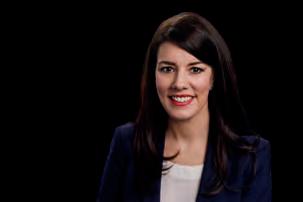
Luis Zamora
Ruth Ferguson
Heather McCarty
Jaime Huling
John Jersin
Parag Gupta
Supryia Ray
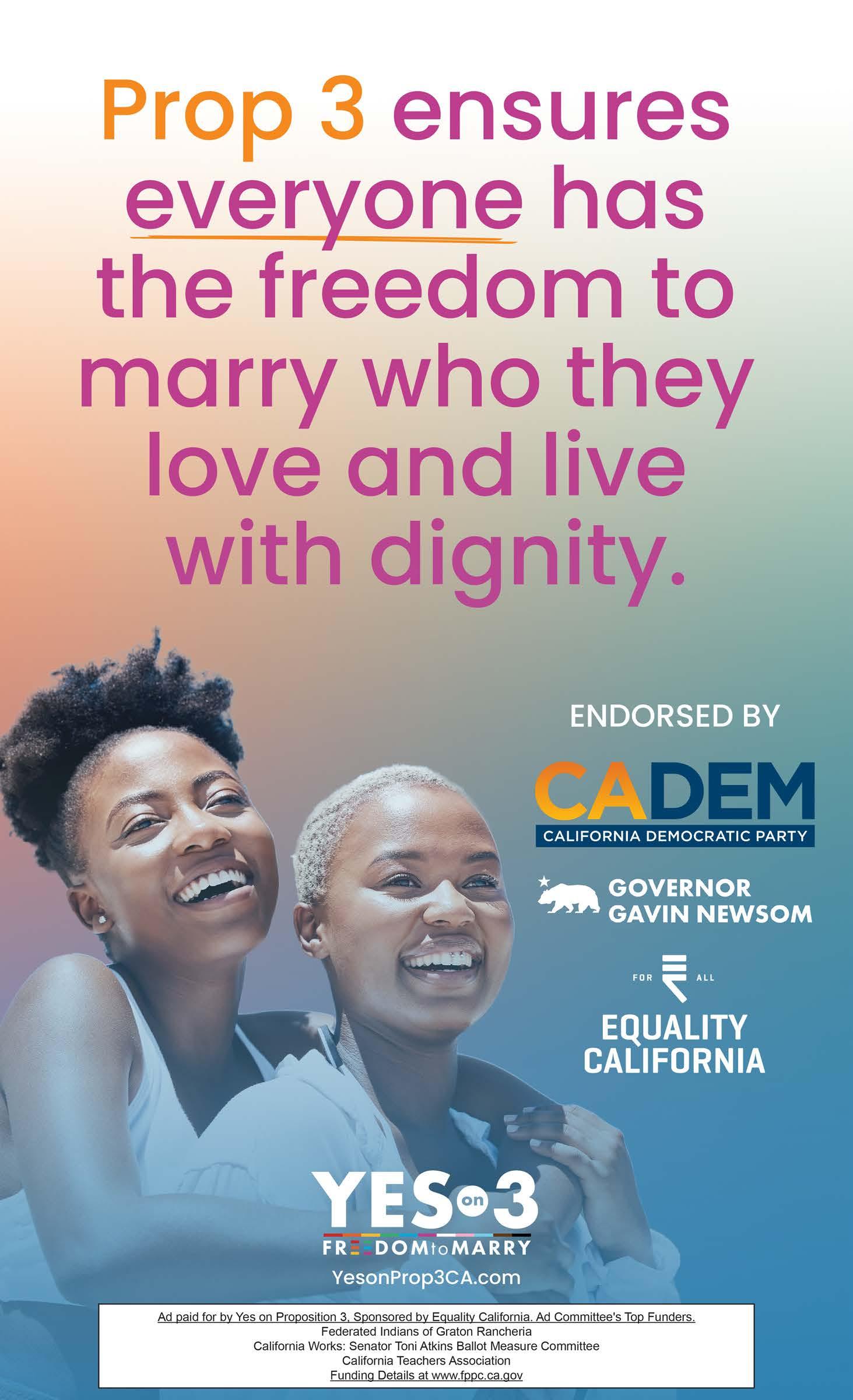
Volume 54, Number 44 October 31November 6, 2024 www.ebar.com
PUBLISHER
Michael M. Yamashita
Thomas E. Horn, Publisher Emeritus (2013)
Publisher (2003 – 2013)
Bob Ross, Founder (1971 – 2003)
NEWS EDITOR
Cynthia Laird
ARTS & NIGHTLIFE EDITOR
Jim Provenzano
ASSISTANT EDITORS
Matthew S. Bajko • John Ferrannini
CONTRIBUTING WRITERS
Christopher J. Beale • Robert Brokl
Brian Bromberger • Victoria A. Brownworth
Philip Campbell • Heather Cassell
Michael Flanagan •Jim Gladstone
Liz Highleyman • Brandon Judell • Lisa Keen
Philip Mayard • Laura Moreno
David-Elijah Nahmod • J.L. Odom • Paul Parish
Tim Pfaff • Jim Piechota • Adam Sandel
Jason Serinus • Gregg Shapiro
Gwendolyn Smith • Charlie Wagner
Ed Walsh • Cornelius Washington • Sura Wood
ART DIRECTION
Max Leger
PRODUCTION/DESIGN
Ernesto Sopprani
PHOTOGRAPHERS
Jane Philomen Cleland
Rick Gerharter • Gooch
Jose A. Guzman-Colon • Rudy K. Lawidjaja
Georg Lester • Rich Stadtmiller Christopher Robledo • Fred Rowe
Shot in the City • Steven Underhill Bill Wilson
ILLUSTRATORS & CARTOONISTS
Christine Smith
VICE PRESIDENT OF ADVERTISING
Scott Wazlowski – 415.829.8937
NATIONAL ADVERTISING REPRESENTATIVE
Rivendell Media – 212.242.6863
LEGAL COUNSEL
Paul H. Melbostad, Esq.


Bay area reporter
44 Gough Street, Suite 302 San Francisco, CA 94103
415.861.5019 • www.ebar.com
A division of BAR Media, Inc. © 2024
President: Michael M. Yamashita
Director: Scott Wazlowski
News Editor • news@ebar.com
Arts Editor • arts@ebar.com
Out & About listings • jim@ebar.com
Advertising • scott@ebar.com
Letters • letters@ebar.com
Published weekly. Bay Area Reporter reserves the right to edit or reject any advertisement which the publisher believes is in poor taste or which advertises illegal items which might result in legal action against Bay Area Reporter. Ads will not be rejected solely on the basis of politics, philosophy, religion, race, age, or sexual orientation.
Advertising rates available upon request.
Our list of subscribers and advertisers is confidential and is not sold. The sexual orientation of advertisers, photographers, and writers published herein is neither inferred nor implied. We are not responsible for unsolicited manuscripts or artwork.
We endorsed Kamala Harris for president shortly after she entered the race back in July – and don’t regret it for a minute. The current vice president has waged a solid campaign for president, despite being held to a different standard than Republican former President Donald Trump over and over again. Trump only needs to meet the ridiculously low bar the mainstream media has set for him. Harris must never make a mistake. The mainstream media learned absolutely nothing from its coverage of the 2016 and 2020 presidential campaigns. “Trump gets to be lawless, Harris must be flawless,” as CNN commentator Van Jones recently said. And so here we are. The race is exceedingly close, and we don’t know what will happen on November 5 or in the days after.
Last week, the billionaire owners of the Washington Post and Los Angeles Times prevented their editorial boards from endorsing Harris and said the papers would not be endorsing any candidate for president this year. That was in effect an endorsement for Trump. It’s not lost on us that the publications happen to be Harris’ hometown papers – she lives in Washington, D.C. and regularly returns to her home in Los Angeles. And so these non-endorsement decisions gave an opening for Trump to exploit, which he did, claiming that Harris can’t even get her own hometown paper to back her, in the case of the Times.
But it’s clear that Amazon founder and Post owner Jeff Bezos and Times owner Dr. Patrick Soon-Shiong caved. They adhered to the concept known as “anticipatory obedience.” That’s when individuals think ahead about what a more repressive government will want, and then offer themselves without being asked, for example by self-censoring, as historian Timothy Snyder has observed, noted CNN Reliable Sources Columnist Brian Stelter. And that is dangerous – just as dangerous, in our opinion, as electing a fascist like Trump to the presidency. People should not, as Snyder offers, “obey in advance.”
Yet, we’re not participating in anticipatory obedience (nor do we have a billionaire owner!). Instead, we will continue to criticize Trump if he’s elected, because freedom of the press matters.
Make no mistake, in addition to all his racist threats against people of color and migrants, Trump will come after transgender people, and the queer community in general, if he returns to the Oval Office. Trans people in particular are already deeply concerned about what a second Trump administration might mean for them. We’ve all heard Trump’s baseless lies about how

teachers are performing surgery on kids at school to “turn them trans.” That’s not even possible, of course; public school teachers aren’t surgeons and schools don’t have operating rooms. There is no way a student would arrive home at the end of the school day having been operated on. But some people believe this crap. Or, more likely, they pretend to believe. You see, Trump’s supporters will say anything, no matter how false, outlandish, or far-fetched, to demonize LGBTQ people. And that includes his incompetent vice presidential pick, Ohio Senator JD Vance, who has repeatedly been called out on his disgraceful statements (i.e., Haitian migrants eating people’s pets) only to double down, knowing they are false.
On Tuesday night at the Ellipse in Washington, Harris delivered her closing argument to a crowd estimated at 70,000 people. It was the exact spot where, on January 6, 2021, Trump encouraged his supporters to storm the U.S. Capitol building in an effort to prevent the 2020 election results from being certified. Harris gave a powerful speech about why she’s the only candidate who can unify the country. She cast Trump as a “petty tyrant,” which he is, and how he would use his presidency to exact revenge on his enemies – real or perceived. He’s “consumed with grievance,” she said, “unstable,” and “out for unchecked power.” All true, by the way.
Harris talked about what she would do for
families, and to expand Medicare coverage for home health care so that seniors can stay in their own home. She vowed to govern as a pragmatist by listening to everyone, including “people who disagree with me.” “I will be a president for all Americans who put country above party and self,” she said.
She talked about helping the middle class by cracking down on corporate price gouging and helping to lower costs for Americans through tax credits for home buyers, parents, and caregivers. And she hammered home the point that her administration would stand forcefully for reproductive freedom. “I will fight to restore what Donald Trump and his hand-selected Supreme Court justices took away from the women of America,” she said.
And while Harris has not made LGBTQ issues a centerpiece of her campaign – a disappointment, but understandable given what she’s up against – she did make reference to the LGBTQ community when she noted “patriots who came before us at Selma, Seneca Falls, and Stonewall ...” when she sees the promise of America.
“I offer a different path,” she said, “and I ask for your vote.”
That’s exactly what people need to do between now and November 5. t
San Francisco voters will be electing the treasurer-tax collector, city attorney, and sheriff on the November ballot. We recommend all three incumbents.

One thing is assured come election night: gay San Francisco TreasurerTax Collector José Cisneros, who is unopposed, will win a sixth term through 2028, giving him a historic 24-year tenure. Should he serve all four years, Cisneros will become the Bay Area’s longest-serving LGBTQ elected official in the same position. He is believed to be the longestserving gay Latino elected official in the country. But it’s not just about Cisneros’ making history that we’re endorsing him. Cisneros has been an extraordinarily accomplished treasurer.
Cisneros has instituted programs that have helped many, many San Franciscans. From kindergarten to college, the first universal automatic child savings account program in the country that he launched with then-mayor Gavin Newsom to Bank on San Francisco, which helps people find affordable bank accounts with no overdraft or hidden fees, Cisneros has long made innovating the office his hallmark.
As his good friend, gay outgoing BART board President Bevan Dufty, told us earlier this year, “I think he has taken his role and he has really elevated it through initiatives such as kindergarten to college, financial justice for all, and Bank on San Francisco, and put his office really in the vanguard of helping people break out of cycles of poverty.”
Public service means something to Cisneros, and San Francisco is fortunate to have him as its treasur-
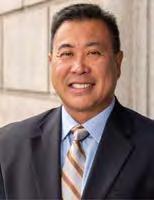
Sheriff Paul Miyamoto has done a good job in his first term. He became the first elected Asian American sheriff in San Francisco when he took office in 2020. He has been with the office since 1996, rising through the ranks. Miyamoto stated on his campaign website that deputies have been deployed with other law enforcement agencies to interrupt the fentanyl trade through Operation Safe Streets. At the same time, the sheriff’s office, which oversees the jails, has supported treatment for those suffering from addiction including harm reduction, jail-based treatment, and abstinence-based residential treatment.
The sheriff’s office, like the San Francisco Police Department, has a staffing shortage. Miyamoto aims to work at recruiting deputies to alleviate this problem. Miyamoto noted, however, that for the first time since the pandemic, hiring new recruits outpaced separations from the sheriff’s office. “The rebuilding of the sheriff’s office rank and file is an ongoing process and remains a top priority both for public safety and the safety of those who serve,” he stated.
Miyamoto also advocates “safety for those in our custody and care by continuing to work with city leaders to establish a facility, separate from jails, where individuals in the criminal justice system who are experiencing mental health or substance abuse crises can receive mandatory, court-ordered detox, withdrawal management, and treatment services,” he stated. “This will help ensure the safety and well-being of those in our custody who are struggling with mental and behavioral health challenges.”

The sheriff’s office also provides security in City Hall, the courts, and at Zuckerberg San Francisco General Hospital and Trauma Center.
We believe Miyamoto has been an effective leader and should be reelected.
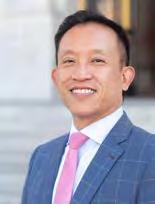
City attorney
David Chiu has been effective as San Francisco’s city attorney, the first Asian American to hold the post. A former supervisor and state assemblymember, Chiu has kept the city attorney’s office proactive, much like his predecessor, Dennis Herrera. Mayor London Breed appointed Chiu in 2021, as the city was continuing to deal with corruption allegations in various city departments.
Chiu has continued to root out public corruption. He’s also worked to fight against the opioid epidemic, to save Laguna Honda Hospital, support tenants, and protect reproductive care and civil rights, to name just some of the issues he has championed. His office formed a worker protection team to investigate companies violating labor laws, his website states. Regarding the opioid epidemic, Chiu led a groundbreaking lawsuit against Walgreens that resulted in the city winning a $350 million settlement to support local substance use recovery efforts.
In short, Chiu, and the deputy city attorneys that work in the office, have done a good job. The San Francisco City Attorney’s office is recognized as one of the top municipal law firms in the country. He deserves another term. t
by Matthew S. Bajko
F our years ago, bisexual South San Francisco City Councilmember James Coleman shocked his city’s political establishment by defeating the city’s then mayor for the newly created District 4 seat on the governing body. At the same time, he was finishing his undergraduate studies at Harvard.
He did so as traditional campaigning tactics were largely mothballed due to the COVID pandemic. His victory that November made Coleman, then age 21, the youngest person on the five-member council and its first out member.
Now 25, Coleman is serving as the Peninsula city’s ceremonial mayor and aiming to avoid the same fate as the person he defeated in 2020. This time, a who’s who of local Democratic electeds in both San Francisco and San Mateo counties have endorsed Coleman’s November 5 bid for a second, four-year term.
Among them are Congressmember Kevin Mullin (D-South San Francisco), whom Coleman unsuccessfully had sought to succeed in the state Assembly in 2022; state Senators Scott Wiener (D-San Francisco), who is gay, and Josh Becker (D-Menlo Park), and Assemblymember Phil Ting (D-San Francisco). His council colleagues Eddie Flores, the city’s current vice mayor, and Mark Nagales have also endorsed Coleman.
“I am feeling very positive and very optimistic,” Coleman told the Bay Area Reporter Monday as he headed into the final week of the campaign.
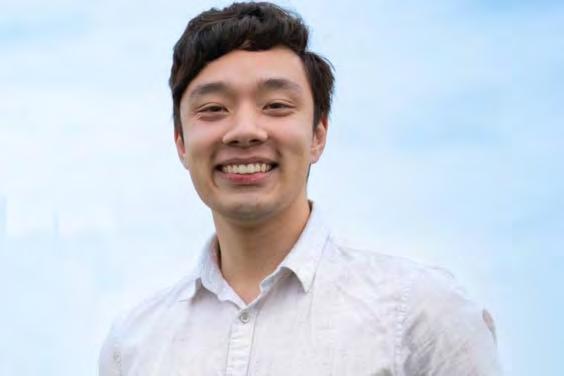
tion and continue to make progress on issues that matter to South San Francisco families the most.”
Challenging him for his seat is South San Francisco Housing Authority Chair Avin Sharma, who emigrated from Fiji nearly two decades ago at age 15 and settled in South San Francisco in 1997. He is raising two daughters with his wife and works as a finance manager for Stanford University.
Sharma has focused on the city’s fiscal outlook as a key issue in his campaign for the seat. Several of the city’s former mayors have endorsed his candidacy, including Richard Garbarino, who lost to Coleman four years ago.

Should he secure a second term, Coleman would remain one of the youngest LGBTQ elected leaders not only in the Bay Area but in the U.S. He has already knocked on 2,500 doors in his district and expects to have hit 3,000 come Election Day.
“We will see. That is what, 100 a day? It is possible,” said Coleman, who since January has worked as an organizer for the California Working Families Party.
The same reasons he first ran for the elected office, such as wanting to address climate change, public safety reforms, and affordable housing, are motivating his candidacy this year, said Coleman. While the City Council has been able to tackle those issues and more during his first term, there is still work to be done, he told the B.A.R.
“What motivated me to run for City Council was I wanted to make sure my community had a voice,” said Coleman. “I didn’t want to see us just sweeping these issues under the rug but tackling them head on.”
Over the last four years the council has secured $28 million toward an 800-unit housing development that will set aside 160 as affordable, allocated $9 million to build a new child care center, and has opened new pools and other civic facilities, noted Coleman.
Two years ago, the city adopted a measure that allows it to build social housing, something Coleman is a big supporter of doing. The council and city staff are in the process of identifying city-owned sites suitable for such projects and how to finance their construction, something he wants to assist with in his second term.
“We have done a lot of great work but there is more to be done,” said Coleman, adding he is “blessed” that the city council and staff work together as a “good team” on various issues. “We need to make sure we move forward in a progressive direc-
“Our budgetary challenges may impact the high-quality services our residents have come to rely upon and we need leadership to ensure that our city gets back on track,” Sharma has contended.
Coleman told the B.A.R. that the council could be facing a $5 million deficit it will need to address in its fiscal year 2025-2026 budget. The city has a total general fund budget of $145 million, plus $70 million in a reserve fund.
A recent budget update found better than projected property tax revenues, estimated at $14 million more than the city had expected, noted Coleman. Plus, city officials are hopeful residents will pass Measure W next week to update its business license tax and bring in $2.6 million a year for the budget.
“We will reevaluate what the fiscal conditions are early next year and reevaluate what the budget should be moving forward,” said Coleman.
As for him having an eye on seeking higher office again, Coleman told the B.A.R. he anticipates serving his full second term. There isn’t expected to be an open legislative or congressional seat in 2026 as there had been in 2022 when he launched his Assembly bid.
“I am committed to South San Francisco for the next four years, at least,” said Coleman, who is not term limited from running again for his council seat in 2028. “I enjoy doing the work on the City Council, and what we have begun, I want to see through.”
He has no regrets about his decision to seek the Statehouse seat, said Coleman, as it helped introduce him to leaders across the county and region. Those connections have paid dividends not only for his role as a council member but also as a candidate seeking reelection.
“It has given me a more regional and statewide outlook when it comes to state policy and local government,” he said. “I am glad I did it. I learned a lot from that experience.”
As is tradition with his city’s mayoralty, he was allowed to host one
big event during his 12-month ten ure and opted to do a Pride celebra tion in June. As part of it, Coleman put together the first-ever drag show held at the town’s City Hall.
“People emailed me and said they never imagined they would see that in South San Francisco. They were very proud to be a part of our city after that,” recalled Coleman, who will hand over the mayor’s gavel in December. “It really provides a good platform to stand up for issues that matter most to people.”

The biggest surprise to being mayor, he told the B.A.R., is the amount of email he has received.
“A lot of people will email you. If they don’t know who their councilmember is, their default is to email the mayor,” said Coleman, who also acknowledged he wasn’t prepared for how busy his schedule would be serving in the role. “There is a multitude of events you are invited to and asked to speak at. It is definitely exhausting but also a good experience and definitely rewarding.”
Coleman’s mother emigrated from Taiwan to the U.S. and at first lived in Ohio, where his father, who was white, was from. His parents moved to the Golden State shortly after having Coleman, who is an only child.
His mother works as a lab assistant at Kaiser. His dad, who died in 2015, had worked for FedEx and became paralyzed from the waist down due to an accident. His injury had Coleman thinking he would seek a career in neurosciences.
But he pivoted toward a career in politics. Last year, he worked as a political director for the campaign of bisexual Assemblymember Alex Lee (D-San Jose) as he laid the groundwork to seek a third term this year.
With it clear last December after the filing deadline for the March primary that Lee was all but assured of being reelected, Coleman resigned and sought the position with Working Families where his boss is former San Francisco supervisor Jane Kim
“We get pro-working-class champions elected to local and state office. We also train local officials to be effective,” said Coleman. “Of course, after the election we will change gears toward supporting our elected officials who win.”
A key to his own political success, said Coleman, is his being a collaborative person.
“We can disagree on one issue but work together on the next issue,” he said. “I have been able to build bridges over the last four years with people I do not necessarily agree with on everything.”
Coleman now hopes those connections will power him to victory Tuesday night.
“I want to make sure South San Francisco remains a high-functioning and forward-thinking city,” he said. t


by his brother, Jeffrey Clark, and his mother, Barbara.
Steven attended the University of South Florida in Tampa before relocating to San Francisco in 1978. For 44 years, he built a distinguished career as a realtor in San Francisco, realizing his dreams through unwavering dedication and passion. His successful career in real estate allowed him to engage in property ownership and management across various communities.
Beyond his professional achievements, Steven was deeply committed to community service. He served on the Board of Directors for several non-profit organizations and participated in committees focused on professional standards, governmental relations, and community service. He was particularly passionate about the San Francisco Society for the Prevention of Cruelty to Animals (SFSPCA), where he volunteered his time, grateful for the companionship of his beloved dog, Oxxo, whom he adopted through the organization.
Steven valued health and fitness, often enjoying walks at Crissy Field with cherished friends. He was an avid music collector, with a special fondness for Depeche Mode. Known for his passion, meticulous nature, and honesty, Steven’s warm heart, vulnerability, and kindness left a lasting impression on those fortunate enough to know him.
In lieu of flowers, donations can be made to the San Francisco Society for the Prevention of Cruelty to Animals (SFSPCA) at www.sfspca.org. A Celebration of Life will be held in his honor at a later date.
page 2
Fifteen out LGBTQ people are running for U.S. House seats this year: 10 incumbents and five challengers. Polls suggest four of those five newcomers could win, and Democrats need a net gain of four new seats in order to take the majority in the House.
Things are a little trickier in the Senate. There are currently 47 Democrats, 49 Republicans, and four independents who caucus with the Democrats, giving the party a 51-50 edge. To maintain control, Democrats would need to hang onto Arizona, Ohio, Pennsylvania, and Wisconsin, keep New Jersey and Michigan, and pick up another seat. West Virginia will almost certainly go to the Republicans – retiring Senator Joe Manchin changed his party affiliation from Democrat to independent. And in Montana, Senator Jon Tester (D) is trailing his Republican opponent, Tim Sheehy.
4 to 5 p.m.
Presidential race: Trump will likely end the hour with 82 electoral votes, Harris 16. If Harris takes either Georgia or North Carolina, a big upset is in the works. Keep an eye on Virginia’s 13 electoral votes. Polls indicate they are “likely” to go to Harris, but an upset there would seriously hamper Harris’ prospects for the rest of the evening.
U.S. House: Incumbent Becca Balint of Vermont (at-large), a lesbian, is poised to win easily.
5 to 6 p.m.
Presidential race: Michigan and Pennsylvania are the swing states to watch this hour. Harris needs both; if Trump wins either, he has a much stronger chance of getting to 270.
or held elective office before and Kim, his Democratic opponent, has served two terms in the House.
6 to 7 p.m.
Presidential race: Wisconsin is a must-win for Harris. Arizona has been close but leaning toward Trump. If Harris has won Pennsylvania and Michigan in the previous hour, Wisconsin would position her to reach the magic mark of 270 electoral votes to win when the West Coast states are reported.
Texas 32nd Congressional District seat. The Dallas Morning News endorsed her, and she could become the first openly LGBTQ member of Congress from the southern states. Gay former congressmember Mondaire Jones is running for New York’s 17th Congressional District seat. The polls show him even with Republican incumbent Michael Lawler.
7 to 8 p.m.
ning, but he has reached only 263 electoral votes, the “blue tsunami” will hit at 8 p.m. with the report of votes from California, Oregon, and Washington. All three will go for Harris, giving her their 74 electoral votes, for a total of 270 if she had 196 electoral votes going into the hour. U.S. House: California and Washington state each have at least one LGBTQ candidate for the U.S. House that is well positioned to win. In California, that is Democrat Will Rollins, a gay man, making his second bid for the 41st Congressional District seat that includes the LGBTQ-friendly city of Palm Springs. He is up against Republican incumbent Ken Calvert, and the latest polls showed them tied. In Washington, state Senator Emily Randall (D), who is queer, was the top votegetter in the open primary, including 23,000 more votes than the other top Democrat and 10,000 more than the second top vote-getter, a Republican. The seat is seen as a solidly Democratic one. t << Election night
Here’s a brief synopsis of what to watch for and when on election night (all times Pacific):
From page 4
“I love being a judge, a legal educator, and a role model for future generations of transgender professionals,” she added.
Zeidler is also a former president of the International Association of LGBTQ+ Judges. Prior to becoming a judge, Zeidler was appointed as a juvenile court referee in 1998, where he was full time in the Edelman Children’s Court and earlier was senior staff attorney for Dependency Court Legal services, where he represented more than 2,000 children and other parties in Juvenile Dependency Court, the release stated. He continues to focus on juvenile issues.
<< News Briefs
From page 4
“That’s a huge ministry for us,” Buringrud said.
St. Mark’s was also the site, back in 2010, of a special service to receive LGBTQ pastors after the Evangelical Lutheran Church in America rescinded its policy prohibiting non-celibate LGBTQ people from becoming clergy. Johnson
Torres represents downtown San Jose and the Qmunity District, the city’s LGBTQ neighborhood. Earlier this month, the San Jose Police Department confirmed it was investigating Torres on suspicion of seeking sexually explicit pictures of a minor online. For his part, the councilmember said the allegations were “entirely false” and part of a blackmail scheme waged against him by a Chicago man he had met online.
In a Snapchat message, Torres stated “when I worked at a site at a college I sucked a student in the control room. Black 17 year old and boom. 9.5 inches at 17,” according to a sworn affidavit from a San Jose police officer.
Matthew Quevedo, a straight ally who is deputy chief of staff to San Jose Mayor Matt Mahan, told the Bay Area Reporter on October 28 he’s heard enough. On October 25, he and other District 3 residents announced the start of a recall campaign.
“When the councilmember wasn’t going to move forward with [a resignation], we decided to move forward with a recall,” Quevedo said. Mahan and Torres’ colleagues on the City Council asked for his resignation October 16, as the B.A.R. reported (https://www.ebar.com/ story.php?ch=news&id=335949). When he failed to do so, his colleagues stripped him of his committee assignments October 23 (https://www.ebar.com/story. php?ch=news&id=336074).
U.S. Senate: Gay hotelier Bashaw is running for the seat left open by Democratic former senator Robert Menendez of New Jersey. (Menendez resigned after he was convicted in July for accepting bribes in return for helping Egypt and Qatar.) In addition to running red in a very blue state, Bashaw has not run for
Zeidler has a B.A. from California State University, Northridge and a J.D. from Loyola Law School.
“I’m very honored to be recognized by the ABA’s SOGI commission,” Zeidler stated in an email. “It is overwhelming to join the ranks of so many past recipients who are personal heroes of mine: Abby Rubenfeld, Kevin Cathcart, Evan Wolfson, Kate Kendell, Phyllis Frye, Shannon Minter, and my dear friend, Jenny Pizer; advocates who have been trailblazers in advancing LGBTQ+ rights.
“I am also in awe of the judicial officers and elected officials who have been past recipients,” he added. “As an openly gay student leader, attorney, and elected official, I have always viewed my seat at the table as just being the placeholder for
was one of those who was received at the ceremony, as the B.A.R. reported. For more information about St. Mark’s, go to stmarks-sf.org.
SFAF to hold open house at new HQ
The San Francisco AIDS Foundation will hold an open house at its new South of Market main office at 940 Howard Street Tuesday, November 19, from 4 to 6 p.m.
He was removed from his roles with the Public Safety, Finance, and Strategy Support; Community and Economic Development; and Neighborhood Services and Education committees.
“Omar Torres is holding his seat hostage and taking away the right to representation from 100,000 residents of San Jose even after the entire council has called for his resignation,” Mahan stated in a news release October 23. “While we don’t have the tools we need to fully remove him from office as the community has asked us to do, we can and have stripped him from all committees, boards, and commissions. I am looking forward to the day when we have a District 3 leader who is worthy of the trust and respect of the community.”
Torres was also stripped of his roles with the Arts Commission, Downtown Parking Board, Library and Education Commission, the San Jose Youth Empowerment Alliance, the Santa Clara Valley Habitat Agency Governing Board, the Santa Clara Valley Transportation Authority (VTA) Board, the Santa Clara VTA Policy Advisory Board – Diridon Station, the Silicon Valley Regional Interoperability Project, the Team San Jose/Convention and Visitors Bureau and the Schools and City Collaborative. Fellow councilmembers replaced Torres on those bodies.
Quevedo told the B.A.R. the recall effort only needs 12% of the roughly 44,000 registered voters in the district, a number he calculates
U.S. Senate: Baldwin is in a very close race to win a third term. Her opponent, Hovde, has a brother whose political action committee has spent several million dollars in attack ads against Baldwin. One attack ad mentions that New York residents have donated $1.3 million to the Baldwin campaign; it did not mention that her opponent, Hovde, has a home and business in Orange County, California. And Hovde’s brother, Steven, contributed at least $2 million to oppose Baldwin.
U.S. House: State Representative Julie Johnson is leading the polls to win the
all of us. As a judge, I have always felt a duty to team with others to address access to justice issues, and can only hope that we have been able to make some lasting impact.”
Galles, who identifies as a lesbian, has represented students in Title IX equal protection or gender equity and sexual harassment cases against school and state athletic associations since 1996, the release stated. She has litigated and supported groundbreaking cases and efforts for equity throughout her career. From influencing Title IX case precedent to arguing or writing briefs on Title IX, Galles is now a mentor for other lawyers on their Title IX cases, the release noted.
Having served in varying roles in the
The party will welcome guests to the new location, an email announcement stated.
As the B.A.R. previously reported, SFAF moved into its new location in early June.
The agency had announced last November that it was seeking to lease a new space in SOMA, where its previous headquarters had been located.
“With our lease expiring at the end of 2023, this was an opportunity for SFAF
at 5,289. A committee has already started gathering signatures required for the main effort to get state approval to collect signatures.
“We don’t want to be six months from now thinking, ‘We should have started six months ago,’” he said.
Based on his reading of the city charter, Quevedo said if the requisite number of signatures are collected and verified, it should be two to four weeks until a date for the recall is announced. If it’s successful, a vacancy is declared and the council can appoint a new member or have a special election. (The candidates to replace Torres will not run on the recall ballot.)
Last week, the council excused Torres’ October 8 absence – which he claimed was due to “illness” – and that allows the member to keep his seat on the council. If Torres misses five meetings without the council’s excusing his absence, his seat would become vacant.
Torres subsequently cited a doctor’s recommendation to allow him “the necessary space to recover.” The recommendation is he takes the next month off. The request, made October 23, has not been approved. Quevedo said that excused absences are among “loopholes that would allow him to stay in office for some time.”
The B.A.R. reached out to Torres’ office for a statement October 28. A staffer who answered the phone declined to comment and referred the paper to Torres’ attorney, Nelson McElmurry, who didn’t return a subsequent request for comment.
Presidential race: The swing state of Nevada, with six electoral votes, has been leaning toward Harris, though some polls have called it a toss-up at this late point. National Public Radio reported this month that the Trump campaign has spent $17 million on campaign ads portraying Harris as in favor of transgender surgery for prison inmates and migrants. The ads are appearing in all seven swing states, including Nevada.
8 to 9 p.m.
Presidential race: If there is – as there was in 2020 – a “red wave” of votes for Trump for most of the eve -
ABA Section of Civil Rights and Social Justice and the Labor and Employment, Litigation and Business Law sections, Galles has worked on legal issues that relate to women, LGBT+, and Title IX amicus briefs, the release stated. She also developed and conducted Title IX continuing legal education programs and assisted with developing and promoting ABA policy. Most notably, she co-wrote the ABA’s Supreme Court amicus brief in Jackson v. Birmingham, Alabama Board of Education and wrote the ABA’s official commentary on the final report issued by the U.S. Department of Education’s 2002-2003 Title IX Commission.
Galles has a B.A. from Creighton University and J.D. from Washington
to reassess the space needs of staff and the communities of people we serve at our main location,” Tyler TerMeer, Ph.D., a gay Black man living with HIV who is CEO of the foundation, stated at the time.
“The downturn in the real estate market in San Francisco and the changing needs of our staff – many who are able to successfully work remotely – have enabled us to make a change that will
LGBTQ groups condemn sex crimes, stereotyping
The Silicon Valley Pride Board of Directors, Qmunity District President Nathan Svoboda, and BAYMEC Community Foundation Executive Director Ken Yeager, the first gay man to serve on the San Jose City Council, released a joint statement October 25 stating that they don’t “take a position on the specifics of the allegations,” but that they condemn sex crimes in general as well as false stereotypes that LGBTQ people are more prone to commit them.
“Child sexual abuse/assault/exploitation, or any other criminal activity, has no place within or connection to the LGBTQ+ community,” the statement reads. “Incidents like this, regardless of the individuals involved, fuel harmful stereotypes and misrepresentations about the LGBTQ+ community as a whole.
“We condemn all forms of abuse/ assault/exploitation and any association with such actions does not reflect the values of our community,” the statement continues. “Our mission remains to advocate for justice, equality, and the dignity of all people. We are committed to fighting against stereotyping narratives that target marginalized communities.”
The statement refers victims of sexual abuse, assault and exploitation, and/or discrimination to groups that can help them: the National Human Trafficking Hotline for crisis support; Legal Aid Services for legal assistance; the Rape, Abuse and Incest National Network for
University School of Law.
“I am thrilled and surprised by the Stonewall Award news,” Galles wrote in an email. “It is wonderful to be recognized by people I like and respect as much as the people from the SOGI Commission (and the civil rights and social justice section who nominated me). I also am surprised and humbled to be included among so many exceptional current and past awardees.”
Galles added that she has long worked with the ABA’s SOGI commission and its civil rights and social justice section “for a long time to promote equality under the law and to advocate for ABA policy on many issues, including LGBT rights. We have come a very long way over the past 30+ years.” t
ultimately result in cost savings for the organization and improved access for our clients.”
At the welcome party, there will be a procession and blessing of the space by Aztec dancers, Mariachi music in honor of SFAF community program El Grupo’s 40th anniversary, representation from all of its programs and services, and refreshments, the email stated.
To RSVP, go to sfaf.org/welcome. t
counseling and mental health support; the National Domestic Violence Hotline for immediate help; the LGBTQ Youth Space for youth support services; and the County of Santa Clara offices of behavioral health services and LGBTQ affairs.
The B.A.R. asked Silicon Valley Pride and the Qmunity District why they won’t take a position on whether Torres should leave office, and if they have a position on the recall.
“Silicon Valley Pride won’t comment on an ongoing/open investigation,” Silicon Valley Pride CEO Nicole Altamirano stated in an email October 28. “Additionally, as a nonprofit organization, we maintain a nonpartisan stance and do not engage in, endorse, or comment on political matters, including recall elections.”
Svoboda and Yeager didn’t return requests for comment. The nonprofit BAYMEC foundation is separate from the Bay Area Municipal Elections Committee, the LGBTQ political action committee focused on the South Bay and Santa Cruz County.
Quevedo said he’s looking forward to talking with LGBTQ groups and community organizations in District 3.
“I don’t want to speak for those,” he said when asked about the LGBTQ leaders’ stances in their joint statement. “I want to talk to community organizations like BAYMEC –the entire committee looks forward to speaking with them and having them weigh in. We’re feeling good right now with the folks who are involved.” t


Aby Gregg Shapiro
new album by a band you love, especially one that takes its time between releases, is cause for celebration. For me, that celebration takes on special meaning when it comes to Betty, an all-female trio I have been following since the mid-1980s, during the band’s early years.
Since that time, Betty have amassed a sizeable following via its connection to “The L Word,” performing on the HBO/CTW series “Encyclopedia,” appearing in an original off-Broadway musical, and playing Pride and women’s music festival events.
The newly released “EAT” has everything we’ve come to know and love about Betty: fabulous harmonies, a splendid cover tune, and songs with messages of empowerment, as well as humor.
Gregg Shapiro: For those few who may not be in the know, please say something about how the name of the band, came to be.
Alyson Palmer: We just needed a name fast for a party for Dodie Bowers, dancer and music mogul who ran the legendary 9:30 Club on F Street in DC. She invited us to sing without our full band at the time, On Beyond Zebra. There was a Nair ad on TV at the time where long-legged ladies walked past a besotted guy who said, “Helloooo, Betty!” and that’s what stuck with me. Surfer slang with a timeless appeal and just a smidge of street harassment.
Elizabeth Ziff: We said we would love to and thought she wanted the whole band, but she just wanted the three of us. We had no idea we would be Betty for almost 40 more years.
Amy Ziff: Betty is the all-American, smart, sassy, can-do gal with a twist. That’s us!
GS: In Betty ’s early days, the band began selling t-shirts that read ‘BETTY Rules.’ How did that slogan come about?
AZ: It didn’t come from us! I think it’s a catch phrase that fans and friends started.
EZ: I remember that people would shout it to us on the street in DC. It just stuck. It was better than BETTY rocks….and it’s stood the test of time. Some people have theirs from back in the day, but lots of new, young fans are buying them now and wearing them proudly. It’s definitely a cult [laughs].
GS: Please tell the readers something about the mission of The BETTY Effect.
AP: The BETTY Effect is an organization that

uses music and performance techniques to help strengthen, embolden and empower women, girls and LGBTQ+ folks. Betty has found that anything can be achieved if done in harmony with community, no matter how long it may take.
That’s why we travel around the world holding workshops and concerts to connect people in need of bolstering with the beauty of their inner rock star, with their posses, and with local organizations that can serve their immediate needs and continue to help grow confidence. At the end of the day, that’s all it takes – believing in your mission and believing you are the right messenger. It’s so simple but can seem impossibly hard, until you have your crew who believes in you. The BETTY Effect builds crews from inside out.
GS: “EAT” is Betty’s first new full-length album in a number of years. Were all the songs written over the course of the period or were they written in one burst for the purpose of the album?
AZ: Great question! Some were written recently, and a couple were actually rewritten and changed while recording.
AP: Every seven years we get the itch and pop out another album. Some of the songs have been incubating for quite a while but two burst out from skeletal beginnings in the studio with our fabulous producer, Jason Carmer and Human Fader, who are
wildly creative and fun artists to create with in sexy Mexico City.
EZ: Some songs have been churning around and changing and forming for a few years, some were written during the pandemic, and some came together for this album. All of them are new in the way that they have changed and grown.
GS: The anthemic “Pride,” the first single from “EAT,” was released in advance of Pride 2024. What does Betty’s embrace by the LGBTQ+ community mean to you, as either a member or an ally?
EZ: Being a big lez, and also a gay man in lesbian clothing, I’m all about it. I pretty much assume everyone is gay until I find out shockingly that they’re not.
AP: It. Is. Everything. The two times I felt myself break bounds I realized that society had wrapped around me were the first time I saw LaBelle on TV as a child, where, terrified, I saw for the first conscious time that women could be fantastical and scary and explode with power without caring what men or anyone thought, and my first Pride Parade in DC.
Seeing the riot of wit and color unleashed by people who had just as much right as anyone to love and be loved, but had to fight to exist, I had the epiphany that I stood surrounded by joyful warriors. They risked it all, proud on the streets, snapping their




fingers under the nose of anyone who tried to deny them. I saw they were the evolved ones, the ones who lived like artists at least in that moment, freely, and I fell in love spiritually, not physically, with this tribe I understood.
GS: “Pride,” as well as “Flow,” “Soundproof,” “Gangway,” and “Big Size Love,” have irresistible dance energy. Have you ever been at a club and heard a DJ spin a Betty song? If so, how did it feel?
EZ: I’m a DJ (DJ ezgirl), so I’ve spun them, and it feels great to watch people dance to our music. Recently, we had the pleasure of hearing our song “Pride” and the remix by Bill Coleman and Peace Biscuit spun by the amazing and infamous DJ Lina Bradford in front of thousands of new folks and they dug it. So, that’s amazing. Let’s hope DJ’s all over the world spin our stuff.
AP: It’s a rollercoaster! At first you think. “I know this song. Who is this?” Then you realize. Then you’re slightly embarrassed. Then you fling yourself into the experience with joyful abandon, loving it even more as it’s released into the wild!
AZ: Seeing people groove, dance, and respond to our music is what it’s all about!
GS: Betty has some tour dates this fall. What are you most looking forward to about those shows?
AZ: Playing our new songs, seeing old friends, and connecting with new people. And wearing groovy new clothes and getting lots of prezzies from fans [laughs].
EZ: Playing our new music and meeting new fans, and, of course, continuing our wonderful career that never ends.
AP: I love playing live! Like I said, flinging yourself with wild abandon into a song you adore as it’s amplified into the wild is a thrill everyone should have a chance to feel. Like a chef serving a great meal to a crowd or an athlete moving with the stands cheering her on, experiencing the flow of your creative energy connecting with the electric desire of others is a feeling that ignites your whole being like a lighthouse. People flowing along with us by singing along to our songs feels absolutely incandescent.t Read the full interview, with several music videos, on www.ebar.com.




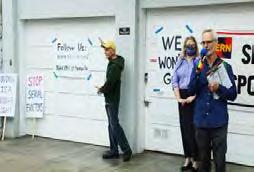



by Gregg Shapiro
Not everyone wants, or can get, a major label record deal. Fortunately, going the indie route affords everyone the opportunity to have their music heard by potential fans.
After releasing albums on the Arista and Velvel labels, as well as Indigo Girl Amy Ray’s Daemon Records, lesbian singer/songwriter Michelle Malone found a home on her own indie SBS Records. Her aptly titled new album, “Southern Comfort” (SBS), is where Southern rock and country music intersect, with the title track about homesickness being a perfect example.
“I Choke on My Words” is a stunner and deserves to be a hit for Malone (or anyone wise enough to cover it). Also noteworthy are “I Want to Be in That Picture,” “Like Mother Like Daughter,” “One Track Mind,” and “Wine and Regret.” www.michellemalone.com
Since the mid-2010s, gay singer/ songwriter Jim Andralis has been making consistently powerful and memorable music. Andralis’ firm belief in “the power of love and the power of music” has sustained him and his fans over the course of five remarkable albums, including his latest, “Ghosts,” available on spooky, cloudy grey vinyl.

Andralis populates the album with fittingly haunting songs such as the devastating “5 Minutes,” about the love and loss of a dog; “You,” about his friend the celebrated late singer and vocal coach Barbara Maier Gustern; “Brookly,” Andralis’ response to Hugh Ryan’s book, “When Brooklyn Was Queer;” and “Run Hit Cry,” about finding a way through hard times, which is bolstered by Matt Colburn on trumpet. Andralis’ inclusion cover of Annie Lennox’s “Love Song for a Vampire” is a perfect fit in this setting.
www.jimandralismusic.com
“Dooda” is the new album by Durham via New York City queer singer/ songwriter/multi-instrumentalist (including Omnichord!) Matty Frank Frank’s musical style comes across as a combination of Rufus Wainwright and Sufjan Stevens’ theatricality and inventiveness (“Moonflower” and “Fabulist”), Billie Eilish experimentation (“Moth”), contemporary country rock (“Wasted”), and even a touch of Hedwig (“Circle of Sand”). Even with all those audible influences, Frank has succeeded in creating an original and captivating album that benefits from repeated spins. www.mattyfrank.bandcamp.com
Queer singer/songwriter Mike Maimone is one of those prolific musicians whose talent can’t be confined


to one space. As a solo artist, with a voice that recalls young Tom Waits (and piano skills to match), he’s as comfortable making pop music as he is working the country croon (as he is currently doing in Nashville).
As the lead vocalist of Mutts, during the 2010s, he demonstrated that he could work well with others over the course of a few albums. To commemorate the eleventh (!) anniversary of Mutts’ timeless album “Object Permanence,” it’s being rereleased in a newly remixed version as “Object Permanence XI” (8Eat8). In addition to the gorgeous back-to-back numbers “Prizefighter” (which deserves to be a hit) and “Out of Tune,” Mutts tear things up on “No Loot,” “Pickpocket,” and “No Loot.” www.muttsmusic.com

It’s always fascinating to see what becomes of the queens in their post“Drag Race” period. Genderfluid Pandora Boxx (who made quite an impression on viewers with her Carol Channing impression) has returned to “RuPaul’s Drag Race” a few times over the years and performed at numerous live shows and theatrical events.
For their debut album “Boxx,” they wrote all the songs and even included one in which they could wheel out the Channing impression (“Raspberries”). Of the ten tracks, including the “Gay” (with its “Okay to be gay” message), seven are straightforward club bangers. Boxx doesn’t possess an especially powerful singing voice, and the closing track “Scurvy” should be avoided like, well, scurvy. Neverthe-


less, it sounds like they’re having fun, and there’s nothing wrong with that. www.pandoraboxx.com
Queer Canadian folk/roots singer/ songwriter Jeffery Straker returns with his ninth studio album “Great Big Sky.” Anyone who doubted that Canadians could turn up the torch and twang as well as the folks in Nashville or Austin were proven wrong by Shania Twain and kd lang. Straker shares Twain’s ability to prove that there are no borders when it comes to country tunes. Standout numbers include “Better Than What We Found,” “More Than Two by Fours and Timber,” the country swing of “Brand New Light,” and the beautiful “Dandelions.” www.jeffstraker.com
Led by queer frontwoman Jen Dot and featuring trans musician Jesse Fevvers, Chicago quintet Beastii makes rip-roaring dance punk on its new album “Follower” At just over two minutes in length, the second track “The Limit” exemplifies the spirit (and blistering brevity) of early classic punk. “Spilt Milk” and “Butch Beach” conjure images of surfers riding the waves of Lake Michigan, while “Evil Eye” and “Trusted Mystik” represent darkwave at its eeriest. www.beastie.bandcamp.comt
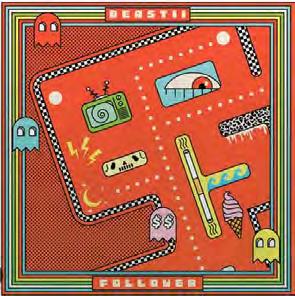
Sweet ‘70s Bay Area-set coming of age story

by David-Elijah Nahmod
Dean Lent’s coming-of-age story
“Feeling Randy” (Breaking Glass Pictures) is short and sweet. It passes quickly at a mere 81 minutes and tells a story that will feel all too familiar to gay male viewers. The film will be available at major video-on-demand platforms on November 5.
Young Reid Miller offers a wonderful performance as Randy, a teenager in the 1970s East Bay who struggles with his sexuality while his straight friends talk incessantly about “pussy.” The guys borrow a car and travel to a brothel in Nevada where each guy brags about how “hot” his sex was-flashbacks to each encounter tell a different story. For Randy the trip is a revelation as he realizes that he’s unable to get an erection unless he fantasizes about a guy. The sex worker asks him if he’s sure he likes girls.
Back home Randy is caught by his father experimenting with make-up and lipstick. Dad (Jonathan Silverman) is horrified.
“You’re the last of the Parkers,” Dad shouts. “You’re supposed to give us a grandchild.”
Randy runs out of the house to Luke, a local stoner (Blaine Kern III).
The two get high and have sex in a hot tub where Randy comes to fully realize who he is.
Miller, who previously played a gay character in the independent film “Joe Bell,” is a delight as Randy, a closeted young man who finds that he has no choice but to accept himself.
He’s surrounded by an able cast. Silverman is superb as the strict, conservative father who wrestles with a few demons of his own. Late one night a naked dad is brought home by a police officer who tells the horrified mom (Marguerite Moreau) that dad was caught swimming in a neighbor’s pool, naked with an erection.
“Your father is going to speak to… a very nice man,” Randy’s mother says.
Randy’s friends (Tyler Lawrence Gray, Oliver Wyman and Shane Almagor) are an amusing lot. They drop a lot
of F-bombs and talk about one thing only, sex. They might serve as a reminder for gay viewers as to what it was like to be a gay teen 50 years ago, when we were surrounded by guys like these and struggled to hide our true nature from them. Lent, who is best known for his work as a cinematographer, does a beautiful job recreating the East Bay of the late 1970s. A Farrah Fawcett poster adorns the wall of Randy’s room, and he watches “Space: 1999,” a popular science fiction show of the day, with his mom. Bellbottom pants and long hair are all the rage, and a happy face fad is sweeping the country. It’s Lent’s own story, and he tells it in a film that’s evocative and quite lovely.
“It’s a shame that “Feeling Randy” is going to be seen mainly on streaming platforms. This is a film that deserves of a theatrical release. Hopefully it’ll find its audience online. Look for “Feeling Randy” on November 5 on Video on Demand platforms.t www.bgpics.com

by Victoria A. Brownworth
The season finale of the worst TV show in recent memory airs November 5. If you ever looked at history and wondered how someone like Adolf Hitler or Josef Stalin rose to power, look no further than the daily reports on CNN, MSNBC, ABC, CBS and NBC or the GOP apologists on the Sunday politics shows, not to mention the relentless reality-busting propaganda from Fox News.
While the networks do their best to both-sides authoritarianism and Nazi white nationalist rhetoric from Donald Trump, events like the CNN town hall Oct. 23 with Kamala Harris and perennial disappointment Anderson Cooper highlight “undecided” voters who really make us question critical thinking skills in this country.
Meanwhile, a Univision town hall was headlined as a kinder gentler Trump, but he used it to tell one man who asked what he would tell parents of school shooting victims about gun violence to say guns are crucial to our Second Amendment rights as well as “entertainment,” and to say that January 6 was a day of “peace and love.” The gaslighting is dramatic.
On CNN’s “State of the Union” with Jake Tapper on Oct. 27, JD Vance lied his Maybellined face off in a series of contentious exchanges. Most telling was when Tapper said, “Trump said he going to use the military to go after ‘the enemy within,’ which is the American people.”
Vance replied, “He did not say that, Jake! Show me the quote!”
Tapper then read the Trump quote and Vance pivoted off. Later, Vance

said that Trump asserting that Liz Cheney should be tried in a war tribunal wasn’t fascistic at all. Sigh. All you can do is vote like the lives of the most vulner able Americans are on the line; oh, and perhaps another three U.S. Supreme Court seats.
RHONY of our owny
Let’s face it, any one of Bravo’s “The Real Housewives” franchise is an easy watch and their drama makes everyone calmer. No mention of elections here, friends. It’s just the usual drama and then some.


And “The Real Housewives of New York City” has so much to offer this season. Lesbian fashion icon Jenna Lyons is back and another out lesbian, Racquel Chevremont, is joining the group and really tearing it up. Racquel likes to say of herself that “Just like a painting, you’ll need a couple of looks to figure me out.”
Maybe. There’s a lot of Racquel, a lot of reveals, a whole lot of pigeons and just so much “Did you watch ‘RHONY’ last night?!” to text to your besties in this season. It’s streaming on Peacock if you miss it on Bravo.

Back to Kansas
We didn’t know about this queer gem on HBO, but “Somebody Somewhere” is just so much! It’s delightful, it’s heartbreaking, it’s insightful, it’s so many things.
Starring the amazing comedian/ actress/writer Bridget Everett as Sam, a 40something woman who has gone back to her hometown of Manhattan, Kansas to attend to the aftermath of the death of her lesbian sister. She becomes immersed in her sister’s community even as she tries to figure out her own life and what she’s doing.
The series was created by Hannah Bos and Paul Thureen and also stars out gay actor Jeff Hiller and drag king Murray Hill.
Season three, the final season, premiered Oct. 27, but you really need to watch seasons one and two first. You will not be disappointed. It’s absolutely engaging. Everett is incredible and she has great support in the other cast, particularly Hiller.
Uggs
The use of plastic surgery or “body modification” has become so commonplace that simply everyone is getting an Omnilux face mask or Botox.
In Netflix’s new film, “Uglies,” Joey King stars as the teen protagonist Tally Youngblood in this sci-fi set in a dystopia where everyone is granted cosmetic surgery to turn them pretty, except it’s mandatory at 16.
Tally is eager for her turn to join the rest of society. She never felt pretty and always thought that being pretty would change her life. But when a friend, Shay (Brianne Tju) runs away, Tally embarks on a journey to save her

that alters her beliefs about everything she thought she wanted. “Uglies” also co-stars Laverne Cox as the villainous and devious Dr. Cable.
Grey’s area
We used to be a devotee of “Grey’s Anatomy,” so we definitely wanted to see “Anatomy of Lies,” the new Peacock original docuseries about the shocking story of “Grey’s” writer, coexecutive producer and out lesbian, Elisabeth Finch. What a story.
As Vanity Fair reported in an extraordinary investigative series in 2022, Finch’s “purported diagnosis with chondrosarcoma (a rare bone cancer), having an abortion while undergoing chemotherapy, losing a kidney, and undergoing a knee replacement due to misdiagnosis” were all the stuff of her personal story and writing she did for “Grey’s” and for other publications.
As Vanity Fair revealed, “Finch’s medical history was never verified by any of the publications, and she parlayed these stories into plot lines on the show. After being confronted by her then-wife Jennifer Beyer, Finch confessed that none of these stories were true.”
Wow. So “Anatomy of Lies” will be both fascinating and enraging. It’s stunning what people will do to gain attention. Finch had already written and produced for the hit series “True Blood” and “The Vampire Diaries” before being hired at “Grey’s.” She never had to lie about anything. And yet...t
Read the full column, with trailers, on www.ebar.com.



by Gregg Shapiro
I’ve been an Edie Falco fan since I first saw her in gay filmmaker Eric Mendelsohn’s wonderful 1999 indie feature “Judy Berlin,” then followed Falco several years on “The Sopranos,” and the career high point (pun intended), “Nurse Jackie.”




In “I’ll Be Right There” (Universal/ Brainstorm), Falco plays Wanda, a woman who is there for everyone but herself. As the comforter-in-chief, she accompanies her gambling-addicted mother Grace (Jeannie Berlin) to a doctor’s appointment where she receives a serious diagnosis, albeit one less detrimental than expected.
From there she rushes to the emergency room where her pregnant and unwed (although engaged) daughter Sarah (Kayli Carter) is having a crisis that eventually resolves itself. After that, she arrives late to a therapy appointment with her drug-addicted son Mark (Charlie Tahan) whose therapist has decided to end their sessions because Mark has been lying to him the whole time.
But wait, there’s more! Divorced from Henry (Bradley Whitford), Wanda is in a relationship with bar

owner Marshall (a restrained Michael Rappaport). She is also having an affair with literature professor Sophie (Sepideh Moafi), which brings her a certain sexual satisfaction.
Unfortunately, Wanda begins to realize that Sophie’s compartmentalizing of their relationship might mean that she’s ashamed to be seen with Wanda, whose townie ways might make her stand out among her more educated friends.
It’s a wonder that Wanda can get her bookkeeping work done, most of
which takes place after hours, when those family members who constantly call her are fast asleep. But everything soon begins to unravel.
Remarried Henry has three young children and won’t be able to pay his share for Sarah’s big church wedding. Sarah is unwilling to budge on that subject. Meanwhile, Mark is arrested for breaking and entering. As a means of dealing with his situation, he enlists in the army after he is released from jail.
The one ray of light in Wanda’s life (something to watch for at the conclusion) is Albert (Michael Beach), a former classmate who is also Mark’s upstairs neighbor. The same-gender relationship feels borderline gratuitous, although the response from Sarah and Grace, and even Marshall, is far less insulting than that of Henry’s.
“I’ll Be Right There” is the kind of multi-character family comedy/drama that Nancy Meyers perfected in the early 2000s with “Something’s Gotta Give” and “It’s Complicated.” Having a riveting performer such Falco as the focus elevates the movie and prevents it from going off the rails. Rating: B-t
www.brainstormmedia.com

by Jim Gladstone
“Ispent countless hours in my bedroom pretending to be Eva Peron,” recalled first-time novelist and six-time Tony nominee Chad Beguelin of his cast album-filled childhood in Centralia, Illinois.
A Broadway lyricist and book writer whose collaborations include “The Prom,” “The Wedding Singer,” “Elf: The Musical,” and Disney’s “Aladdin,” Beguelin writes what he knows and has always loved in his literary debut, “Showmance,” a romantic comedy about a gay Broadway theater artist.
The novel follows the rude trajectory of writer/composer Noah Adams after his first Broadway production, based on “King Lear” and set in outer space, is panned by the critics and closes after one performance.
On the same night as this simultaneous debut and debacle, Noah’s farmer father suffers a heart attack.
Our beleaguered hero heads back to his midwest hometown, only to meet further adversity. He gets longdistance dumped by his New York boyfriend and discovers that the hunk who bullied him for being gay in high school has become his father’s favorite farmhand.
There’s never a doubt that all will work out in the end for Noah, and the book’s plot hits largely familiar beats. But with the entertaining snap of his dialogue and the endearing sap of his characters, Beguelin crafts a satisfyingly old-fashioned story infused with contemporary mores.
Fewer rules, less waiting
In a recent interview with the Bay Area Reporter, Beguelin acknowl-
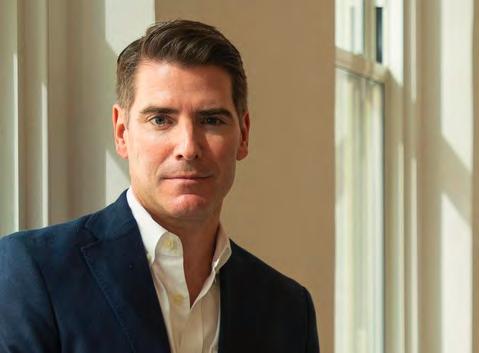
Author Chad Beguelin
edged the differences he found between writing the book of a musical and writing an actual book:
“The main thing is that, with musicals, you’re always working with collaborators who you bounce ideas off of. On every show I’ve worked on, the whole creative team gets together and creates a very detailed outline where we try to figure things out, especially where the songs belong. It’s called song-spotting. Then the songwriters and book writers work independently for a little while, and then they come back and start to put things together.
“Writing the novel, it was just me,” he said. “I’d experiment and secondguess myself and switch things around
Broadway

until I had something I liked. I’ve learned that fiction writers talk about either being ‘planners,’ who outline everything in advance, or ‘pantsers,’ who go by the seat of their pants. I definitely realized that I was a pantser.”
Beguelin said he enjoyed the new independent process.
“It was exciting for me to just explore on the page and not be certain about what would come next, because it’s so different from how I work in theater, especially when it comes to writing lyrics. There are so many rules with lyrics. Every word matters, and it’s also got to rhyme, and you want it to rhyme in new, surprising ways. It can feel like building a ship in a bottle; you’ve got
by Michele Karlsberg
It all started with a single story; a oneoff essay written by a mom trying to make sense of her experience parenting her seventeen-year-old trans son. Two years later, “Trans Anthology Project” is a complete, expertly curated, 310-page collection of stories and poems by more than 30 authors from across the country, the voices of 150 more who participated via anonymous survey, and educational content from a therapist with more than a decade of experience in the field.
During the project’s evolution, the mission remained the same: to offer direction, hope, and a sense of community to anyone feeling isolated, alone, or scared as they venture onto a gender-diverse path, whether directly or in support of someone they love.
Heather Kirby is a therapist in the Washington, D.C. area who has worked with hundreds of genderdiverse youth and their families over the past decade. She also offers professional training and consultation to mental health providers interested in better supporting their gender-diverse clients.
Chrissy Boylan is a parent to a transgender young adult, writer, and yoga teacher from the Washington, D.C. area. Her previous work has appeared in several online and offline publications, including the Washington Post.
I talked with co-authors Boylan and Kirby about the origin, evolution, and release of “Trans Anthology Project,” out now wherever books are sold.
How did you get the idea for “Trans Anthology Project?”
The seed for the book was an essay Chrissy wrote and shared with Heather. The essay chronicled her struggle to re-educate herself on outdated notions of gender when her eldest child came out as trans while in high school. Heather immediately saw the
slowly as I wanted. It was very satisfying to be able to set my own pace.”
Writer’s blocking
Ironically, it was only after he began working with Marie Michaels, his editor at Penguin Books, that Beguelin realized he needed to take responsibility for some of the work that directors tend to handle in the theater.
“She would tell me that I was missing the blocking. ‘Where is everybody?’ she’d ask. ‘Where are they all standing?’ There’s a scene where there’s a big kiss, and she asked me, ‘Where are Noah’s hands? I can’t see what’s going on.’ I had to take charge of making things visually clearer for readers.”
On the other hand, said Beguelin, Michaels seemed impressed by the way the stakes kept relentlessly rising for Noah throughout the novel.
very little room to move in. In some ways, writing a book felt totally freeing for me. I had so much latitude.”
Beguelin also noted that the solo nature of fiction writing offers a welcome counterpoint to the sometimes lumbering machinations of theater production.
“When you’re working on a new show,” he explained, “the process is so stop-and-start. You have to wait for a director or actor’s schedule to work out; you have to wait to find the right theater to be available to make things work economically. There’s a lot of waiting. But when I had the idea to write a novel, I realized that I didn’t have to wait for anything. I could work as quickly or
“But that’s something you have to do in a musical. You’ve got to keep getting your characters into such a heightened state that they can’t do anything but burst into song. I do think that probably affected the way the plot develops in the book.”
Beguelin is currently developing a new musical called “Horrible People,” a mistaken-identity farce that skewers both one-percenters and social climbers (A recent workshop with Tony winners Sutton Foster and Beth Leavel was well received), but he hopes to continue writing novels as well.
“And, of course,” he says, “I’d love to do ‘Showmance’ as a musical.”t
‘Showmance’ by Chad Beguelin. $19, Penguin Books www.penguinrandomhouse.com www.chadbeguelin.com
New collection of stories written for and by gender-diverse teens and their parents
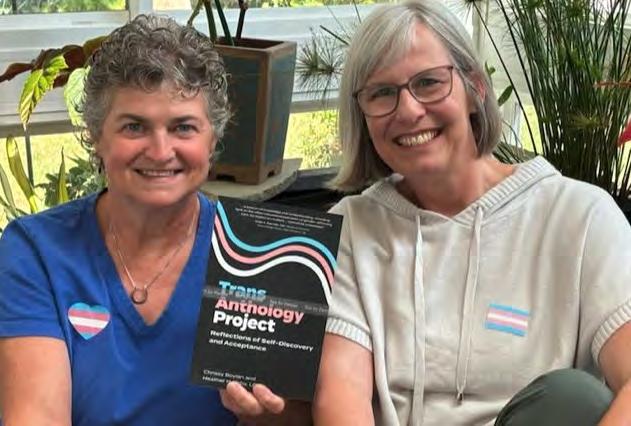
potential of harnessing a collection of stories, the type of stories she heard daily from gender-diverse youth and their parents, to build understanding and acceptance. Chrissy loved the idea and additionally suggested they include educational content based on Heather’s decade of experience in the field. The result is the exact book Chrissy wishes she had had when her son came out five years ago.
How did you go about collecting all the stories and personal insights in the book?
We felt strongly that the book needed to reinforce the myriad ways gender can be explored, identified, disclosed, and expressed. Thankfully the internet allowed us to cast a wide net.
Using social media, email networks, and subsequent word of mouth, we
invited gender-diverse youth and their parents to participate in free online writing circles and additionally put out a call for submissions.
At the same time, we knew that not everyone was interested in writing a full personal account so additionally hosted anonymous surveys online (one for youth and one for parents) to maximize the number and diversity of personal insights and anecdotes captured by the project. The final piece of the puzzle was to fund the project through small donations to show readers that there is more support for the community than they might think.
Between our Instagram followers, our donors, contributors, and readers, this community is that much larger than when we first set out to write Trans Anthology Project.
Who is the book for?
We wrote the book first and foremost for gender-diverse youth and their parents. The reality is that most parents today likely came of age before the millennium not knowing a single person who identified as trans, nonbinary, or gender queer and may have only just become familiar with those terms in the last decade.
Meanwhile, the younger generation has grown up with a deep appreciation for these concepts and navigate gender-diversity with impressive dexterity. The result is a generational knowledge gap that too often leads to misunderstanding, frustration, and fear. We created Trans Anthology Project to bridge this gap by providing a more personal perspective from which to learn about, appreciate, and ultimately support gender-diversity in
our families and communities.
That said, we’ve also been pleasantly surprised by how useful the book is to extended family, friends, therapists, coaches, teachers, and anyone wanting to deepen their understanding. Even readers with little information or exposure to gender-diversity can gain key foundational knowledge, which is particularly important given the current political discourse.
What’s the response been so far?
The response has been overwhelmingly positive! Within the first week of its release, we heard from a school counselor outside Detroit who had a kiddo come out to her after spying “Trans Anthology Project” on her bookshelf. Since then, we’ve also had multiple parents reference specific stories that helped them better understand their child’s experiences, gender-diverse teens who couldn’t put the book down, and allies passing the book on within their communities.
Is there anything next for “Trans Anthology Project?”
We hope so! Right now, we’re doing the work of getting the book in the hands of those it could help most. In the future, we hope to adapt it to an audiobook, as well as create a more resource- and story-driven website where gender-diverse youth, their parents, and others can find education, personal perspectives, and resources. And who knows? Maybe there will be a Volume Two someday.t
www.transanthologyproject.com www.kcclinicalsolutions.com www.chrissyboylan.com
Michele Karlsberg Marketing and Management specializes in publicity and marketing for the LGBTQ+ community. This year, Karlsberg celebrates 35 years of successful campaigns. www.michelekarlsberg.com






Photos by Steven Underhill






